CANE GROWER
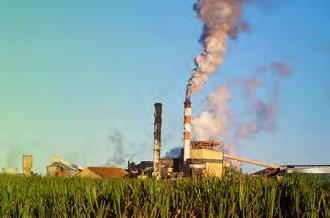
BIG WET ARRIVES
Season ends as it began, with flooded cane paddocks

Mills confident maintenance work will be complete ahead of 2023 season
Grower's close call a reminder of the importance of workplace health and safety

Adaptability and collaboration the key for longevity for Innisfail grower
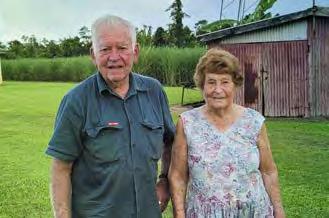
AUSTRALIAN THE OFFICIAL MAGAZINE OF AUSTRALIA'S SUGARCANE INDUSTRY February 2023 Price $14.95

Your policy can provide cover for loss of crop due to accidental fire, transit and hail incidents. CANEGROWERS YOU’RE COVERED! HAIL FIRE CANEGROWERS MEMBERS AUTOMATICALLY HAVE ACCESS TO CROP INSURANCE COVER AS PART OF YOUR MEMBERSHIP. CANEGROWERS Insurance is a Corporate Authorised Representative (CAR No 297969) for Community Broker Network Pty Ltd | ABN 60 096 916 184 | AFSL 233750. For more information, contact your local CANEGROWERS Office www.canegrowers.com.au/insurance

WET-SEASON WORRIES?
If the weather events of the past month have left you with soaked ground and water runoff it’s likely you’re dealing with poor root uptake due the wet conditions, as well as nitrogen loss via leaching and runoff.
Utilising LiquaForce’s new range of Valu and Stable products to your mid-season fertiliser regime will help boost cane growth in the wake of flooding and soil inundation.
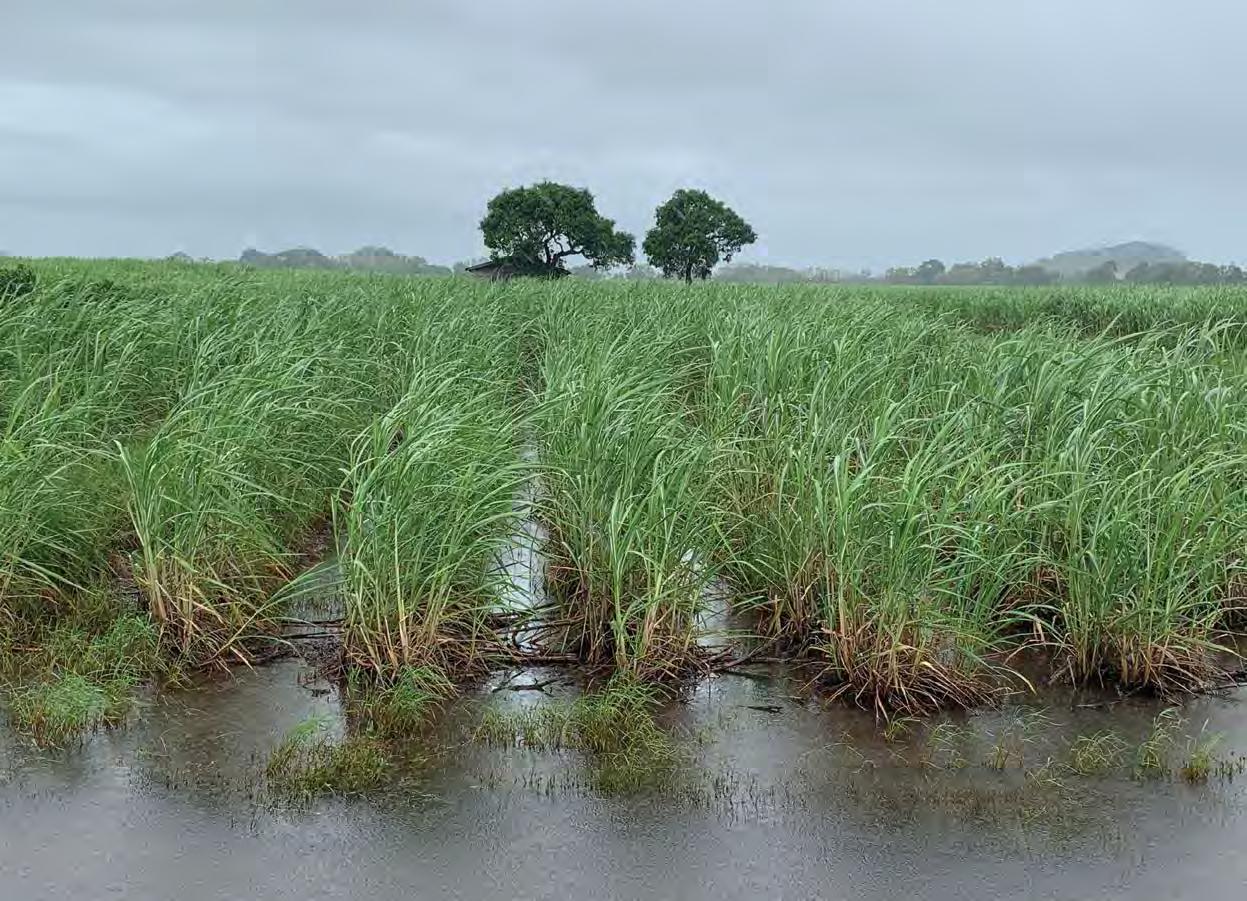
By adding ValuN to your normal herbicide options, you
can boost plant uptake of nitrogen quickly to help get your crop back on track.
Valu and Stable fertiliser products will also help offer an insurance policy to allow you to quickly top up any shortfall of total applied nitrogen.
LiquaForce is ready to assess your crop needs via soil and plant tissue analysis and provide a tailormade solution for your crop, while remaining inside all regulatory requirements for nitrogen use.
VALU AND STABLE RANGE BY LIQUAFORCE: YOUR INSURANCE POLICY TO QUICKLY TOP UP ANY NUTRIENT DEFICITS IN YOUR CROP AND GET IT BACK ON TRACK
VALU N: 25%N STABLE N: 37%N with 9% organic carbon VALU NK: 20.5%N with 5%K
STABLE NK: 30%N with 5%K and 9% organic carbon
TULLY
LIQUAFORCE.COM.AU
CANE?
COVERED.
SOGGY PADDOCKS? YELLOW
LIQUAFORCE HAS GOT YOU
LIQUAFORCE: YOUR FIRST CHOICE FOR LIQUID FERTILISER FROM MACKAY TO MOSSMAN
INGHAM REGION
MACKAY REGION Don McNichol, 0429 540 066 don@liquaforce.com.au BURDEKIN REGION Robert Woods, 0429 658 318 robert@liquaforce.com.au
Cameron Liddles, 0427 765 711 cameron@liquaforce.com.au
REGION
HERBERT REGION
FNQ REGION & TABLELANDS
Maurice Shephard, 0457 924 762 maurice@liquaforce.com.au
Giano Celotto, 0428 187 633 giano@liquaforce.com.au
Jordan Villaruz 0404 787 144 jordanDs@outlook.com.au
CALL YOUR LIQUAFORCE AREA REP TODAY:
COVER IMAGE
Flooded cane paddocks in Proserpine.

Photo credit: Rob

Read more on page 12
Editor: Wayne Griffin
Design & classifieds: Justin Fulton
Published monthly by:CANEGROWERS, GPO Box 1032, Brisbane, Queensland 4001 Australia. ABN
subscriptions
12 issues
Articles appearing in Australian Canegrower do not necessarily represent the policies or views of CANEGROWERS.
94 089 992 969 Telephone: 07 3864 6444 Email: editor@canegrowers.com.au Website: www.canegrowers.com.au Subscriptions Yearly
for
(postage included)
04 News briefs
ugar-powered air travel a step closer 05 Maryborough Mill G rowers confused over mill deal 06 Need for speed Mills confident maintenance can be completed 08 Mackay biohub Government gets behind proposed $300 million facility 10 CEO comment G rowers need certainty and confidence in their industry 14 From the Chair Input from growers essential to continue good research 16 Split second can shatter lives 2022 was bad year for safety in Queensland's sugar industry 22 Rodent rampage Millions of native rats descend on Queensland cane paddocks 24 Road to longevity A n ability to adapt and collaborate ensured lifetime of prosperity for 91-year-old Innisfail grower Joe Cini 34 Regional round-up 40 Policy updates 44 Legal updates 47 Classifieds 44 Rainfall report
Within Australia: $176 inc GST Overseas (AUD): $265
S
Murolo.
SUGARPOWERED PLANES A STEP CLOSER.
University of Queensland researchers have found a way to more efficiently convert sugarcane into a building block of aviation fuel and other products.

By zeroing in on a specific enzyme, a UQ team working in collaboration with the Technical University of Munich (TUM) has sped up the slowest step in processing sugar into a chemical called isobutanol.
Professor Gary Schenk from UQ’s School of Chemistry and Molecular Biosciences said isobutanol from a renewable resource could be used to make fuels, plastics, rubbers and food additives.
“Our research into this particular enzyme means we can accelerate the production rate and yield of isobutanol from sugarcane, ultimately enabling biomanufacturers to make diverse products at scale sustainably and efficiently,” Professor Schenk said.
“Usually during a biomanufacturing process, cells such as yeasts are used as a production platform, but in our research only a small number of a sugar acid-specific dehydratase enzyme was used. “Having sugar-converting enzymes operate outside a cellular environment meant we could bypass many of the pitfalls of the more traditional cell-based biomanufacturing methods.
“This has led to much higher yields of isobutanol with fewer unwanted side products.”
Cell-based production of isobutanol from sugar creates about 25 grams per litre of liquid cell culture but in the UQ study, the cellfree method produced at least 10 times that amount.
“The cell-free method gives biomanufacturers more control and results in much higher yields, meaning a higher return on their investment and a more sustainably produced product – it’s a winwin,” Professor Schenk said.
“One limitation in creating bulk products like aviation fuel with a cell-free process has been the availability of enough enzymes but developments in enzyme engineering and production mean largescale production is now achievable.
“We’re only at the dawn of what is a very exciting age in this space.”
A BUMPER YEAR FOR BIOSECURITY

Australia’s biosecurity teams have been active on the frontline over the past year intercepting over 238,000 biosecurity risk items intercepted at airports and an additional 32,800 biosecurity risk items stopped in mail centres.
The frontline biosecurity officers and detector dogs work tirelessly to help keep Australia free from diseases like foot and moth disease (FMD), African swine fever (ASF) and lumpy skin disease (LSD).
This year the important dog detection celebrated 30 years and the detector dog teams intercepted around 21,000 biosecurity risk items from travellers and in the mail this year alone. The Australian Government committed $11.7 million to the program which will allow for 20 detector dogs and 20 handlers, who will be on the frontline of our biosecurity system across travellers, mail and cargo.
A worthy investment to protect Australia’s agricultural industries, food supply chain, and unique way of life.
THE OFFICIAL MAGAZINE OF AUSTRALIA'S SUGARCANE INDUSTRY 4
Live Leaches detected in post
MILL DEAL DERAILED
Confusion surrounds an ambitious plan to turn MSF's decommissioned Maryborough Mill into a biohub and secure the future of the region's sugar industry, with MSF confirming the recommissioning would not go ahead.
Rumours that the planned mill sale to Australian-Japanese joint venture Advanced Energy Group (AEG) were dead in the water had been circulating in the local community for some time.
However, growers' fears seemed to be confirmed in January when MSF sent termination letters to staff employed on the recommissioning project.
"Those arrangements are now at an end. Consequently, the recommissioning of the sugar mill is not proceeding at this point in time," MSF said of the planned sale to AEG in a statement to local media.
However, if the sale agreement has indeed fallen through, AEG appear to have missed the memo, with the company announcing a Japanese delegation would travel to Maryborough in coming weeks.
"Nothing like a few good rumours and people not understanding the situation," a spokesperson for the company said.
“The fact is that the will be a major corporate delegation from Japan over in a few weeks to tour the region as
part of our strategic plan and we are actually discussing internally regarding recommissioning the mill ourselves. “Due to this the staff, the arrangement for employment will be different being under our banner. Our intention is a regional solution where all of the mills can mutually support each other."
The whole saga has left Maryborough growers confused and frustrated. Local grower representatives have been working tirelessly to negotiate an acceptable Cane Supply Agreement with Isis Central Sugar Mill ahead of the 2023 season.
"The prospect of the sugar mill reopening and new things going on was quite exciting for me as a farmer and for the rest of the farmers in Maryborough," CANEGROWERS
Maryborough Deputy Chair Isaac Schmidt told Seven News.
"Whether the sugar industry in Maryborough is going to continue on as it has in the past, we'll have to wait and see."
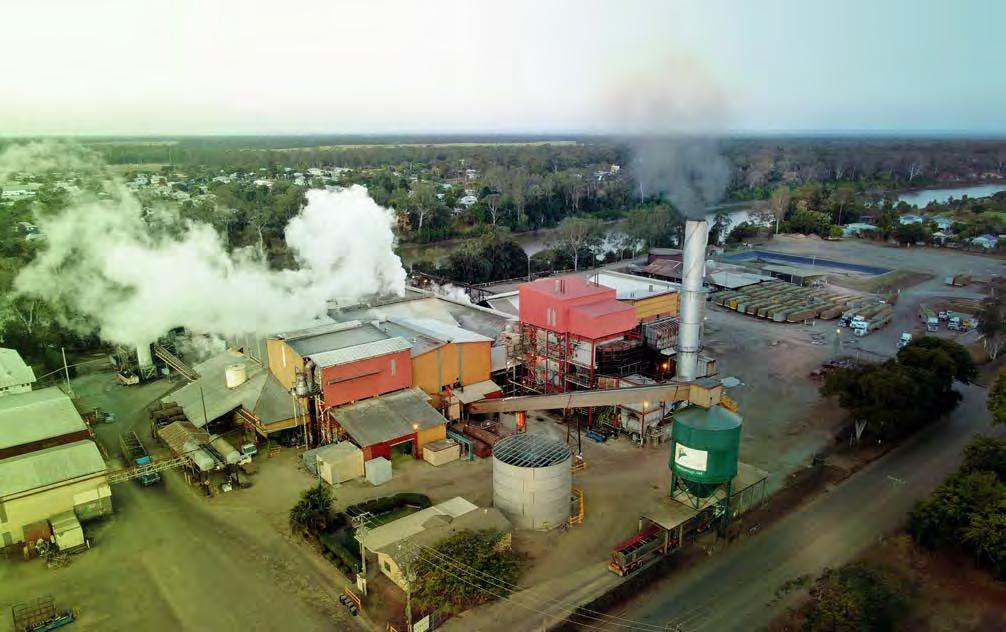
5 FEBRUARY 2023 – VOLUME45/NUMBER 2
Photo: Graeme Wilson
A combination of wet weather and poor mill performance contributed to a disastrous end to the recent crushing period in several districts in a season where crop sizes were well up on previous years. Mills from Rocky Point to the Burdekin were still sending cane through the rollers into January and even then, levels of standover cane are up around the million tonne mark. As growers pick up the pieces, mills are racing against the clock to avoid a repeat performance in 2023.
NEED FOR SPEED
By Renee Cluff
Wilmar’s Proserpine Mill was the last of its mills to crush out for the 2022 season, with the final bin tipped on January 12. Further north, its Herbert and Burdekin Mills racked up more than 12-million tonnes of unharvested cane combined. Factories in the Burdekin operated in the range of 80-per-cent reliability.
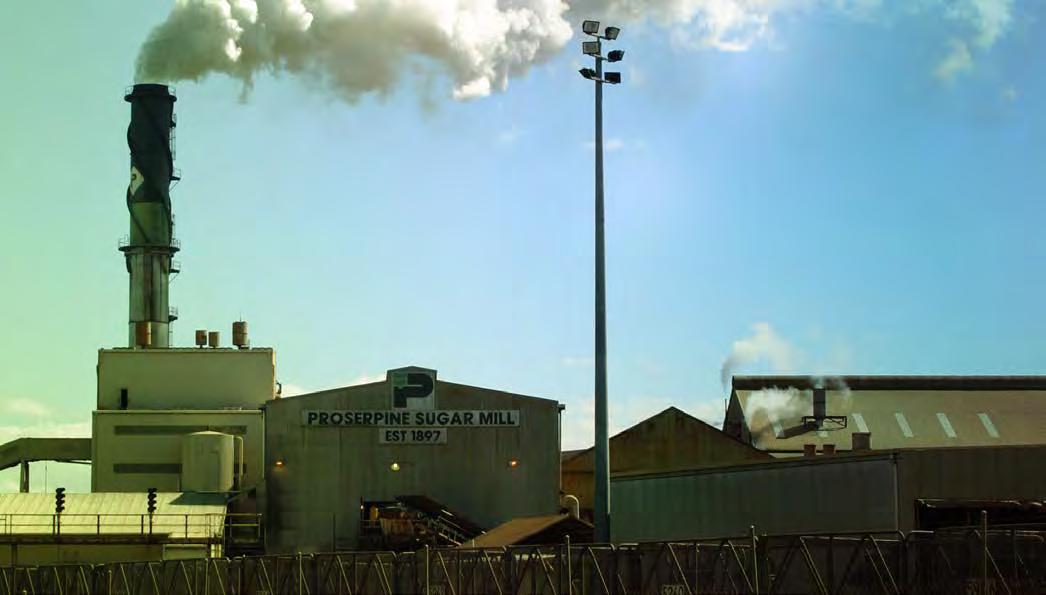
General Manager Operations, Mike McLeod, said the poor performances were in part due to skills and labour shortages.
“It was a very long and challenging season,” he said. “All our milling regions lost a significant amount of time to wet weather, inseason growth meant we had a larger-than-forecast crop, and there were ongoing skills and labour challenges. Some of our
mills also had operational challenges, which meant that factory reliability was not where we want it to be.”
The focus now is on delivering an extensive capital and maintenance program, with hundreds of millions of dollars to be spent. Major projects include two new evaporators for Kalamia Mill, a major boiler station upgrade for Inkerman Mill and a new air heater for boiler 10 at Victoria Mill. New clarifiers, pan vessels and air heater tubes at Macknade, Proserpine and Plane Creek Mills respectively are the other big-ticket items.
“Wilmar International is investing more than $200 million in capital and maintenance in its Australian mills in 2023, with a large number of key
“The late finish to the 2022 season has put additional time pressure around some of the larger projects."
THE OFFICIAL MAGAZINE OF AUSTRALIA'S SUGARCANE INDUSTRY 6
projects to be delivered ahead of the 2023 season,” Mr McLeod said.
“We’ve got contractors working around the clock on these projects and we’re committed to delivering the whole works program.”
At Mackay Sugar’s Racecourse, Marian and Farleigh mills, the maintenance period started before the final cane was crushed. CEO Jannik Olejas has acknowledged mill performance had a detrimental impact on the season but said he’s confident ongoing investment and capital improvement programs are on track.
“It’s not news to us that we have a lot of work to do to bring the mills towards peak performance,” he said.
“Our multi-year plan for future investment will ensure we target the biggest risks and opportunities year on year.
“The things we’re fixing in the mills are in fact delivering improvements. It’s the items that we have yet to approach due to time or resources that presented the majority of our challenges.
“The 2023 season is already showing signs of producing another large crop and we’re excited to see what we can achieve.”
Aiming to start the 2023 crush by June, Mackay Sugar is focused on remedying the key causes
of performance issues. At Farleigh Mill, the maintenance program is concentrated on repairing No.4 boiler. Half of the tubes in the convection bank will be replaced. A 50-metrehigh chimney is being replaced at Marian Mill, while another significant project is the installation of a new air heater on boiler No.1 to deliver further reliability and increase the crushing rate. Racecourse Mill’s 32MW generator will be replaced, and prework will begin on a large evaporator project that will replace the entire west station.
offering various lifestyle rosters including seven days on, seven days off. Drinks coasters at local venues are advertising recruitment opportunities. Fly-in, fly-out mine workers are being targeted through a ‘home every day’ marketing tagline.
Further south, at the Heck family’s Rocky Point Mill, the crush is just over halfway through and will continue until CCS levels fade. Taking ownership of the mill’s cogeneration plant in January last year cost more time and money than expected. CEO David Heck said it was only operating at 50-per cent capacity and major ticket items had to be overhauled, leading to the extremely late start to the crush in October.
going later. I’m sitting on the fence. I just want to get through this season.”
The most northern mill, Mossman, has also had its share of issues, with a slow start due to wet weather and equipment failures. A main turbine was damaged before the season got underway and led to a sluggish crush.
There was also a lack of drivers to transport cane, with growers themselves taking on the role. A lightning strike that took out one of the main alternators late in the season didn’t help.
10,000 tonnes of standover cane was left in the paddocks when the mill wrapped up the day before Christmas Eve.
“On the maintenance front overall, we are in a much stronger position than this time last year with our teams having already secured parts on sites with detailed, resourced, planned work already being started and progressing with a focus on key critical path jobs,” said General Manager of Operations, Carl Morton.
Mackay Sugar has embarked on a recruitment drive for electricians, boilermakers, fitters, riggers and general mill workers,
“We thought the cogen plant would be a lot better than it was and that wasn’t disclosed to us,” he said. “We don’t regret the purchase, though. The industry would have died if we didn’t take it over.
“Local growers are keen to continue and we’ve got to improve the reliability factor. We can see a light at the end of the tunnel and we’re in it for the long run.”
Mr Heck wouldn’t be drawn on when the 2022 season might end and the 2023 season start. “We won’t stop, we’ll just continue though,” he joked. “But in all seriousness, there are two trains of thought: to get going early or to get
As equipment is shipped south for repairs, grower cooperative owner, Far Northern Milling is now on the hunt for a new Human Resources Manager to take charge of recruiting.
7 FEBRUARY 2023 – VOLUME45/NUMBER 2
“There are a lot of growers frustrated and we understand that.”
BIOHUB IS THE SWEET SPOT FOR MACKAY
The Queensland Government has partnered with Cauldron to develop a business case for a large scale precision fermentation manufacturing facility. The government is providing up to $528,000 in funding for the business case for a proposed $300 million facility.
“The proposed Future Foods Biohub facility would provide the large-scale fermentation capacity needed to produce new food products and ingredients at scale to meet growing global
demand, with sugarcane as a potential feedstock,” Deputy Premier and Minister for State Development Steven Miles said.
Cauldron Founder and CEO Michelle Stansfield said Australia has a unique opportunity to become a regional powerhouse in precision fermentation and unlock future breakthroughs in science, technology, and medicine, in combination.
“Working hand in hand with regions like Mackay, we will be able to create
Mackay has the potential to become an Asian-Pacific hub in manufacturing and biorefining thanks to a proposed $300 million project centred on creating “an almost endless list of foods” with synthetic proteins as the building block.
new jobs and unlock future opportunities to create more food, fibre and feed for the world," Ms Stansfield said.
The project strengthens Mackay’s positioning as a state Biohub capital with projects like Mercurius’ pilot plant that converts a range of biomass feedstock, including sugarcane bagasse, into ‘drop-in’ fuels that can be tailored for use as jet fuel or diesel as well as bioproducts.

The QUT’s Renewable Biocommodities research and development facility, hosted by Mackay Sugar
Limited at Racecourse Mill, is expanding and aims to untap biofuels, green chemicals and bioproducts opportunities through the conversion of biomass like by-products from sugar production.
CANEGROWERS Chairman Mackay Kevin Borg said investment like the proposed Cauldron project in Mackay will go a long way towards increasing the value of the sugar sector.
“Up until now government support has been the missing ingredient when it comes to developing
THE OFFICIAL MAGAZINE OF AUSTRALIA'S SUGARCANE INDUSTRY 8
renewable industries using sugar cane,” Mr Borg said.
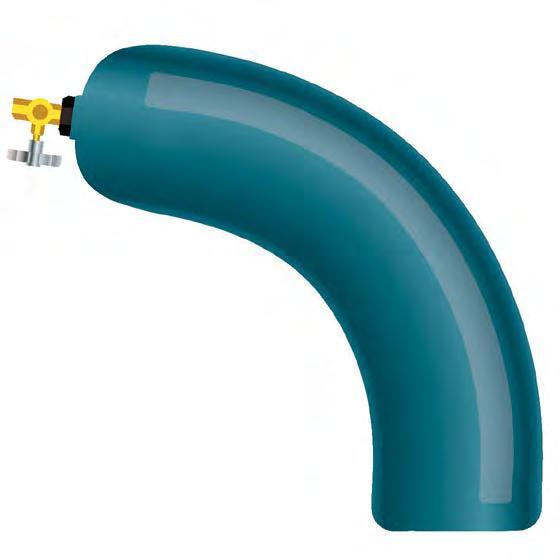


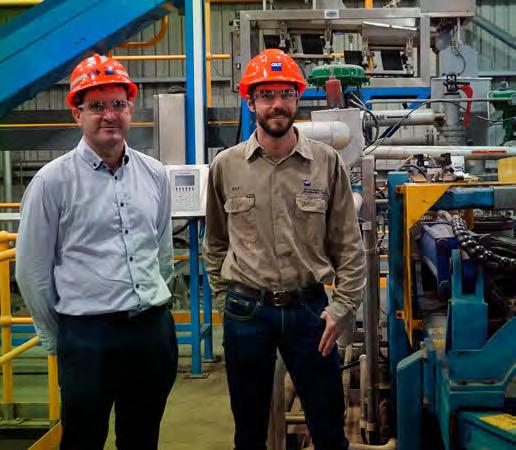
“I know for as long as I’ve been in the industry, we’ve talked about value adding, and the problem has been that we haven’t had government support behind these projects and thus they fell over - with this one here I see it a lot differently.
“When we talk about the sugar industry producing food, fibre and fuels, then we’re in the box seat here
in Mackay.
“We’re an established industry and the Sugar Plus industry road map sets the guiding principles to value adding opportunities, but I think it’s everybody’s view that sugar would still be the mainstay of the industry. This is about value adding beyond the sugar, we’d make the sugar and then the bagasse can be used to develop and produce food, fibre and / or fuels.”
9 FEBRUARY 2023 – VOLUME45/NUMBER 2 Flexible gas use, without all the fuss starting from just $79 per year! Perfect for those who use 1 - 2 bottles each year!* Scan the QR code to find out more
*Terms and conditions apply. Additional handling fees apply in some locations. Order today, visit boc.com.au/flexigas
BOC is proud to be partnered with Canegrowers
PRIMARY PRODUCERS NEED CERTAINTY FIRST
BY DAN GALLIGAN, CEO CANEGROWERS

Industry diversity was a hot topic in 2022. Three years of work by CANEGROWERS, in partnership with Sugar Research Australia, the Australian Sugar Milling Council, and other grower representative groups, delivered an excellent first step in outlining the genuine, credible and potentially enormous opportunities for the industry to share in a rapidly emerging bioenergy market.
This work was underlined by our participation in the Deputy Premiers Sustainable Aviation Fuel (SAF) roundtable, which drilled into the potential for a Queensland-based SAF industry that would service Australia’s airline sector as it moves to low emissions fuels.
Through these discussions we heard how airlines have no choice but use these fuels if they are to meet the responsibilities placed upon them by markets and in some cases the government, which will require high impact industries and companies to contribute to low emissions targets.
This was really the last of many relevant announcements last year, but the momentum for development has continued, with a range of government announcements occurring during the first month of 2023.
The Queensland Government is starting to recognise the need for investment and, importantly, the need for policy backing to support industry development and evolution.
The need for these types of changes was forecast in the Sugar Plus road map.
Nothing significant will happen in terms of new industry development without proactive, enabling policy and investment decisions by government.
But there is another, even more important area of investment that must be encouraged and recognised for our industry to expand and evolve. That is within the grower community.
The single biggest driver of industry evolution has always been the investment made by growers.
This investment can take the form of real dollars in machinery, crop inputs, assets and, most of all time.
But greater than all of these is the investment growers and their families make by applying their confidence in the industry.
Of course, this confidence in the future of our industry must be shared across the supply chain, but no significant evolution or change will occur anywhere unless growers have the confidence to stake the future of their farms and their family’s livelihood.
So that is why all industry investors, whether they be existing processers and manufacturers, marketers and millers, researchers and policy makers, must demonstrate confidence within the context of what they will bring to the table. This will encourage grower confidence.
Expressing confidence can be done without threatening the need for honest conversation, nor does it require us to suspend reality and be naïve.
Investors needs to be clear and transparent about their plans and future objectives, researchers need to be out in the field sharing their future innovative approaches and explaining them in terms what they mean to our current farming system, and government needs to set a clear and focused agenda for industry development that provides certainty and avoids undue political interference or constant goal shifting.
There are actions at all levels, but it will be growers who can lead changes and evolution in our industry.
"But greater than all of these is the investment growers and their families make by applying their confidence in the industry."
THE OFFICIAL MAGAZINE OF AUSTRALIA'S SUGARCANE INDUSTRY 10
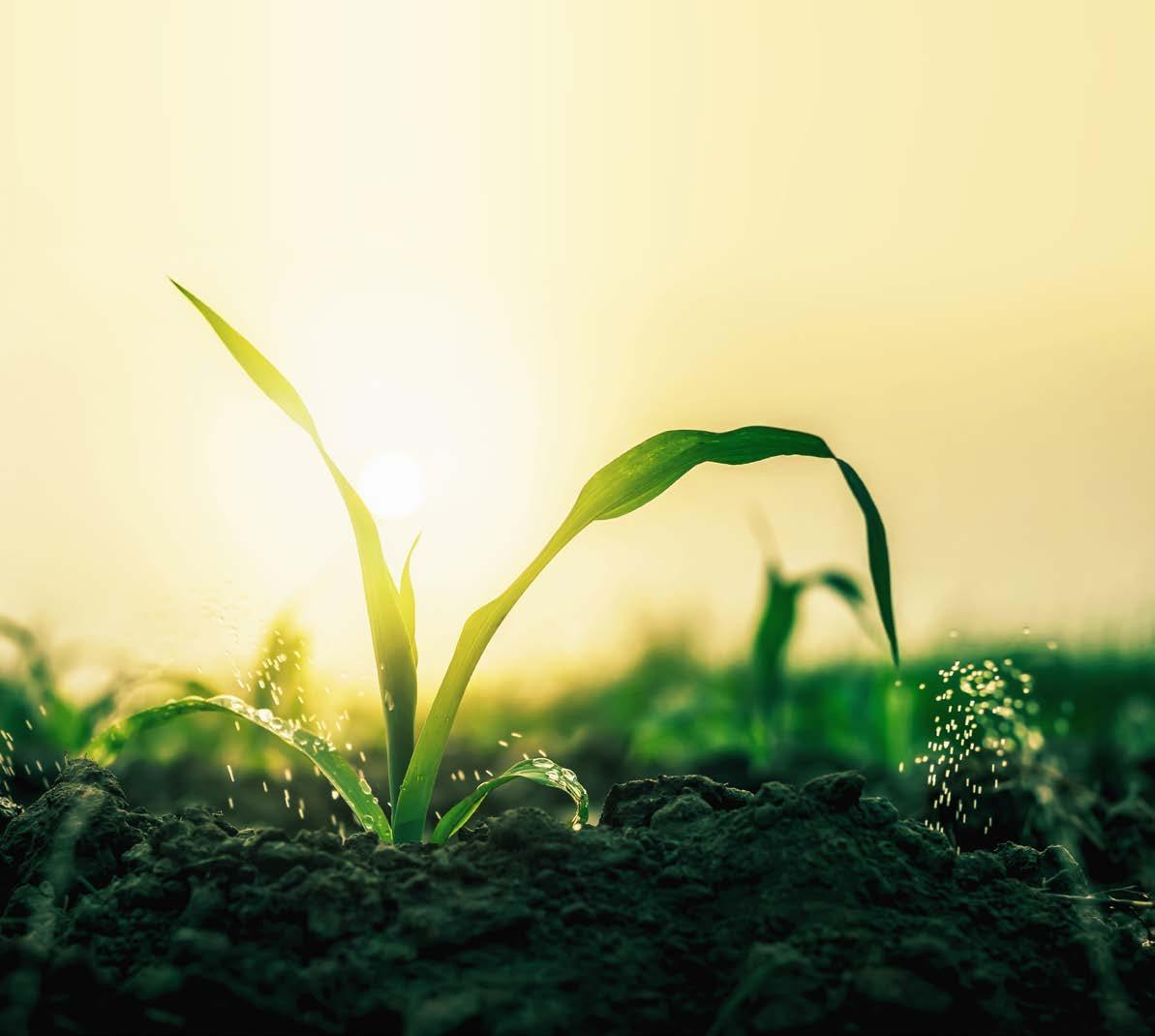
CANEGROWERS BUSINESS ESSENTIALS professional development for growers Workshops start in February 2023 – Register your interest by 20 January All cane growers, family members and farm employees are welcome. This program is jointly funded through the Australian Government’s Future Drought Fund and the Queensland Government’s Drought and Climate Adaptation Program. www.canegrowers.com.au Register your interest by scanning the QR code, contact your district office or visit the Business Essentials page on the CANEGROWERS website. Better understand business costs Easy-use tools to mitigate risks Better sugar pricing decisions Reassess and focus on your business Flexible self-paced online modules SEED BUSINESS SUCCESS FOR 2023 AND BEYOND CANEGROWERS Business Essentials workshops provide hands-on tools to better understand your business finances with highly experienced farm economists, sugar marketing and risk specialists. 11 FEBRUARY 2023 – VOLUME45/NUMBER 2
THE RAIN CAME FALLING DOWN
The strong monsoonal rain event in January brought a sudden end to a very long 2022 season in many districts with Mackay and Proserpine withstanding a solid wet season over a short period of days.
Monsoonal Mackay
Sugarcane growers are a resilient bunch and whilst the weather forced Mackay Sugar to call the crush out on 13 January for many growers it was good to see the rain, given the failed wet season of recent years.
With some reports of wash outs and erosion caused by fast moving groundwater in paddocks across the district creating concern and groundwater laying in fields it was a relief when subsequent fine weather ensured the fields were able to dry out and Pioneer stayed below minor flood levels.
Mackay Area Productivity Services CEO Anthony Schembri said the weather event had created issues in the Farleigh/Richmond/ Habana area, just to the north of Mackay, with the
area receiving a localised pulse event of 250mm in around an hour. This damaged the Mackay Sugar’s
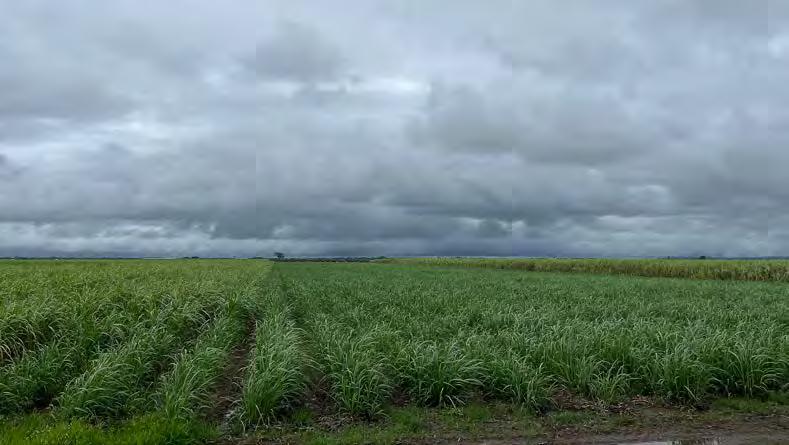
and down onto river flats and for some growers there has been some damage to established ratoons but to
MOST OF THE CROP IS LOOKING REALLY GOOD WITH SOME GROWERS EXPECTING AN EVEN BETTER CROP FOR THIS COMING SEASON AT THIS STAGE BUT THERE MAY BE SOME DAMAGE TO CANE AREAS WHERE CANE IS YET TO BREAK GROUND/ GERMINATE..
tramlines in the area that will require repairs during the maintenance period before the crush starts again this coming season.
Groundwater swept trash off recently harvested fields
date thankfully the damage has not been widespread.
While the Mackay district saw a solid wet season event that brought an end to the crush, the issue going forward into the 2023 season
Heavy monsoon setting in on Jan 13 when Mackay
THE OFFICIAL MAGAZINE OF AUSTRALIA'S SUGARCANE INDUSTRY 12
Sugar crushed out - photo credit Kirili Lamb
will be the impact on standover cane on growers.
Proserpine’s Precipitation
At the time of print the waters in the Proserpine district had largely receded and growers were out assessing the damage according to CANEGROWERS Proserpine District Manager Brendon Nothard.
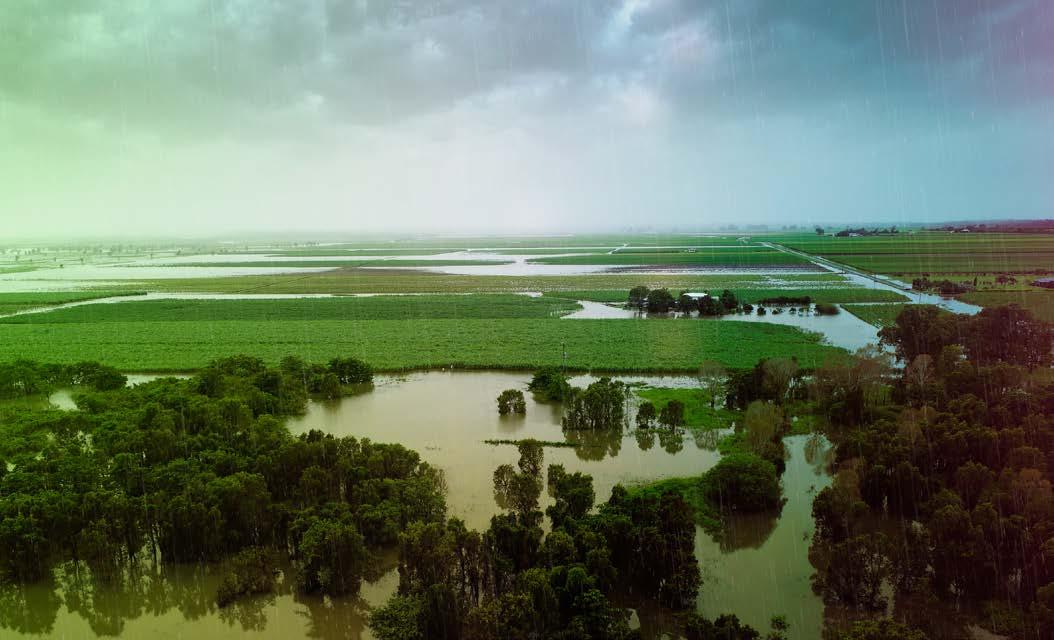
“I have had a handful of members report damage to roads and creek walls, including a few pumps going under water,” Brendon said.
“It’s largely unknown at this time the final outcome of the cane fields, some growers have expressed concern about their late ratooned areas and fallow, but the impact will only be known in the coming weeks.
“In general most of the cane remains in good condition with
some paddocks lodging due to the combination of wet soil conditions and winds.”
The monsoonal rain doesn’t appear to have significantly impacted the crop and there is a cautiously optimistic outlook for the upcoming season.
“Most of the crop is looking really good with some growers expecting an even better crop for this coming season at this stage but there may be some damage to cane areas where cane is yet to break ground/ germinate.
“Despite some areas receiving in excess of 1,000mm of rainfall, the rain came over a number of days which meant damage is expected to be limited.”
 Photo: Supplied by Mackay Sugar
Photo: Supplied by Mackay Sugar
13 FEBRUARY 2023 – VOLUME45/NUMBER 2
South of Proserpine, photo credit Rob Murolo
FROM THE CHAIR
By
The crushing is finally over in all areas except Rocky Point. Unfortunately, we are at least a month behind where we should be regarding the crop cycle, which creates difficulties, especially given the wet season is now upon us.
Now is the time for growers to put in the final touches for next years crop. Fallow ground needs to be prepared by destroying the old stool, bed forming or planting fallow crops.
The cane is growing well, but unfortunately so are the weeds, therefore this is also the time for spraying chemicals.
Growers will make decisions about the amount of chemical used, the timing of application, and the placement of the spray based on the weather and the conditions of the crop being sprayed.
For many of us, these decisions are second nature due to practical experience and trials done in previous years. However, the initial work carried out to ensure the efficacy and safety of all new and existing chemicals is also a hugely important factor. This all comes back to one thing - research.
We are lucky in the sugar industry to have a world class research body in Sugar Research Australia (SRA).
Not only do they carry out a huge amount of research into all facets of growing and milling, they also develop and own the varieties we use in the paddocks.
This is unusual in most Australian agricultural industries as most industries are beholden to large overseas companies for their seed stock.
With this in mind, it is vitally important for growers to be at the forefront in providing SRA with input into their research and variety development.
Growers are the ones who eventually have to make a living out of the research, so it is important that they get input into the process.
CANEGROWERS has always worked closely with SRA and we will continue to do so.

Over the next few months, we will head into what is the field day season. There are events in most districts designed to help growers with the latest research. I encourage growers to be engaged and participate as much as they can in these regional events.
We also need growers to put their hands up to be ambassadors for SRA as grower reps in their region.
These roles are important in determining the direction of our research organisation as well as the future of our industry as a whole.
Our industry is on the cusp of huge changes through the implementation of the Sugar Plus road map.
This plan details an opportunity for growers and millers to expand the sugar industry while diversifying their income streams to items beyond sugar.
To deliver this will require confident growers and informed and innovative research.

"We are lucky in the sugar industry to have a world class research body in Sugar Research Australia."
THE OFFICIAL MAGAZINE OF AUSTRALIA'S SUGARCANE INDUSTRY 14
Owen Menkens, Chairman, CANEGROWERS
Good research must be grower focussed




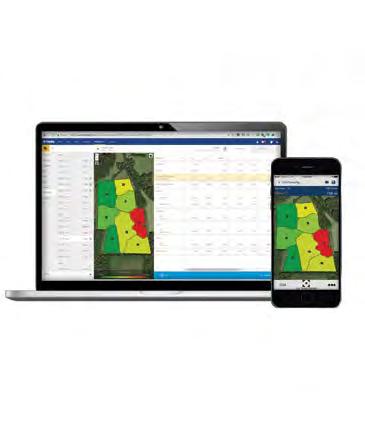
SPLIT SECOND CAN SHATTER LIVES
By Renee Cluff
The recounting of a horrifying cane farm accident serves as a reminder of the importance of workplace health and safety.
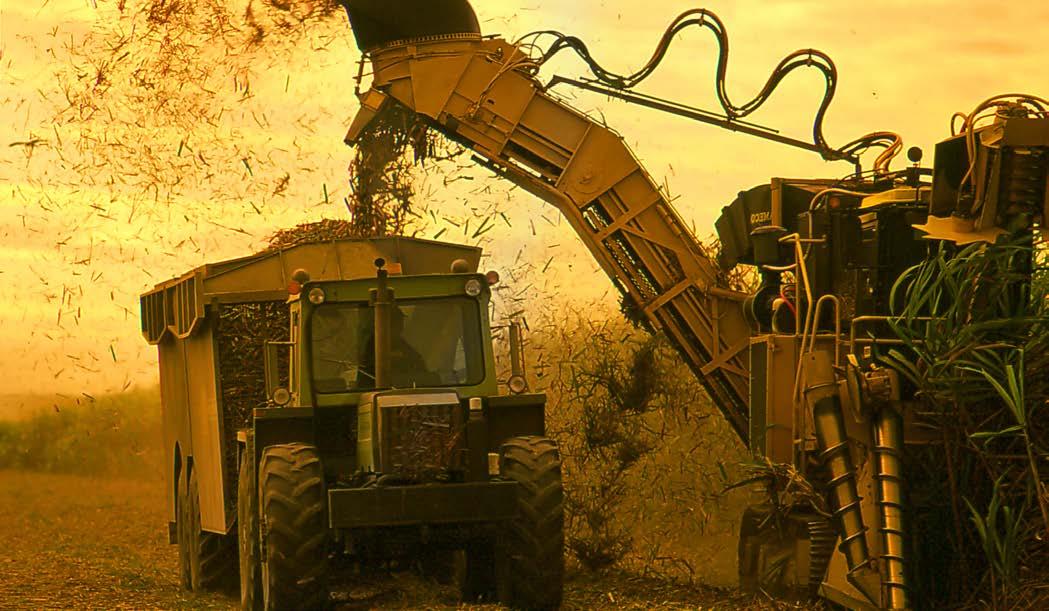
Almost a decade ago, 64-year-old Barry Lynch was involved in a cane farming accident that nearly cost him his life. While he survived against the odds, the incident has forever altered every aspect of his day-to-day existence. The fateful day occurred when he was contracted to spray weeds on preemerging plant cane at a

Tully farm, a task he’d carried out numerous times in his 30-year career.
Barry was towing a spray tanker weighing around 9,000-tonnes when the tractor’s drawbar snapped on a small slope. He was able to reverse back to even ground, lift the tanker up with chains and lower it onto a block of wood before detaching the trailer from the tractor so repairs could be carried out back at the shed. It was when he was under the tractor disconnecting the centre pin with a spanner that the tanker rolled off the block of wood, crushing his outstretched leg.
“It took me clean out and trapped me for six-and-a-half hours,” Barry said. “There was a lot of pain, I thought I’d
THE OFFICIAL MAGAZINE OF AUSTRALIA'S SUGARCANE INDUSTRY 16
blackout, but I never did. I immediately had to take my work boot off because I could feel my leg expanding. Then I started losing a lot of blood.
Shouting for help and clattering the spanner against metal weren’t enough to get anyone’s attention. Covered in hot hydraulic oil in the heat of a tropical day, Barry drank water from the drainpipe of the air conditioner on the still-running tractor while he contemplated what to do.
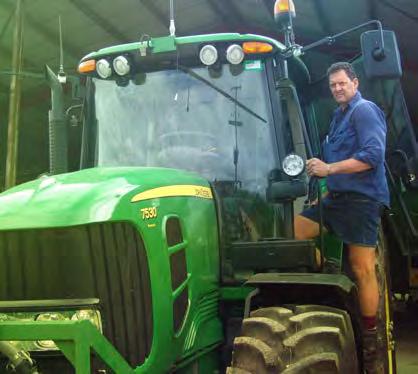
Unfortunately, his phone was in his ute, which was parked nearby. Using his late father’s pocket knife, which he carried at all times, Barry began digging his leg free, using the spanner as a chisel hammer. Hours later, he finally managed to wriggle free.

“The leg was just flapping,” Barry recalls. “I crawled over to the car, got my bottle of coke, had a big swig and I had to ring triple-0.”
After some frustration trying to communicate his exact location to a city-based emergency operator, an ambulance finally arrived.
“When they cut the leg of my jeans off, all they could see was a big black hole,” Barry said.
“The leg expanded that much that it actually tore the skin and started bleeding out.
“The paramedics were amazed I was still alive because the blood had turned septic.
“I shouldn’t be here because of all of the toxic blood. The leg was dying. It was going all black like rotten meat.”
26 operations, multiple skin grafts and more than one lifethreatening infection later, the ongoing impacts for Barry are both physical and mental.
While he’s learned to walk again, albeit with a brace, he remains in chronic pain and has been unable to return to work.
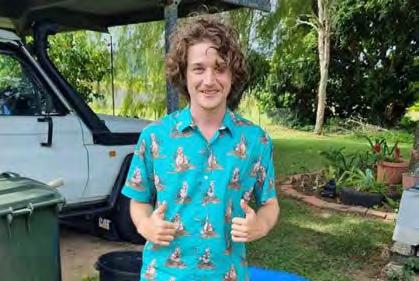
THOSE WE LOST IN 2022
“The paramedics were amazed I was still alive because the blood had turned septic.
“It was scary. I thought, ‘I’m in a lot of trouble here.”
In June, newly retired Tully grower Mario Raccanello died in a tractor accident on the Atherton Tablelands. He was 59.
87 year-old stalwart Tony Galea died in August in a truck rollover on his Alligator Creek farm in the Mackay region. His son Mark was injured.
Mario Raccanello
Tony Galea
Qhaleb Quinn
17 FEBRUARY 2023 – VOLUME45/NUMBER 2 Continued next page
In November, 21 year-old haulout operator Qhaleb Quinn died when the tractor he was driving rolled on a public road in the Innisfail district.
There have also been bouts of depression and recurring nightmares.
“It’s been a struggle ever since,” Barry said. “I was too young to give up work. I went through bad depressions over the accident.”
Barry’s experience is not isolated. According to WorkSafe Queensland figures, an average of 47 sugarcane industry employees apply for workers compensation each year. Wounds, lacerations and amputations are among the more common injuries, and being hit by an object the most common cause. While the rate of injuries and deaths is on a slight downward trend, one life lost is far too many.
In 2022, the industry mourned the lives of three men killed in farm accidents, including well known and respected growers Mario Raccanello from Tully and the Mackay region’s Tony Galea. Emerging Innisfail industry member Qhaleb Quinn lost his life at the young age of 21.
Now is a good time to refresh your workplace safety knowledge. Visit the CANEGROWERS website to download the Workplace Health and Safety Guide for Sugarcane Farms.
SEARCH ON FOR NEW NATIONAL AG LEADER
The National Farmers’ Federation (NFF) Horticulture Council has launched the search for its next chairperson, with inaugural chair Fiona Simson due to step down mid-year as her term as NFF President comes to a close.

Ms Simson said now was the perfect time for a change in chair, with a mounting commitment from the NFF and member bodies to the Council, and a clear need to work more collaboratively and speak with one voice nationally on key issues impacting the industry.
“The Council is really starting to hit its straps. Established less than five years ago, it has been building momentum and gaining recognition as a valuable, representative, and trustworthy source of advice to government on what is a complex and multifaceted industry," Ms Simson said.
“For the next chair, as the Council evolves, becoming more mature and independent, and as the horticulture industry continues its own path of growth and transformation, there will be great opportunities and also challenges.
OTHER SERIOUS INCIDENTS
A man in his 60s was airlifted to hospital after suffering significant leg injuries caused by moving bins at Wilmar Sugar’s Inkerman Mill.
A man in his 70s was crushed by cane cutting equipment on a property north of Mackay. He was flown to hospital suffering head, chest and abdominal injuries.
Five Wilmar Sugar employees were taken to hospital after an industrial accident at Inkerman Mill. One suffered chemical burns, while all five had respiratory-related symptoms.
“The Council and national horticulture industry needs, and deserves, an excellent and accomplished chair and leader, so it’s really exciting to start the search today.”
In selecting the successful candidate, the Council will be putting emphasis on experience chairing governing or policysetting bodies and facilitating productive and inclusive debate.
Applications for the position of chair of the NFF Horticulture Council are now open and will close 5pm Wednesday 1 March.
THE OFFICIAL MAGAZINE OF AUSTRALIA'S SUGARCANE INDUSTRY 18
Pictured: Out-going NFF President Fiona Simson with former CANEGROWERS Chairman Paul Schembri.
QSL GROWER PRICING UPDATE
Sugar Market & Currency
InfluenceCommentary
Your Trusted Partner
Current as of 19 January 2023.
Brazil Only 6 sugar mills continued to harvest into late December. 541 million tonnes of cane has been harvested and 33.5 million tonnes of sugar produced by the end of 2022.
India 2022/23 Season harvest has been progressing well with the 515 operational mills producing 15.7 million tonnes of sugar by mid-January. There is still uncertainty as to whether the Indian government will announce additional export allocations and add further supply to the world market.
Thailand
Speculators
Currency
Despite a slow start due to wet weather, harvest has progressed quickly with 21.2 million tonnes of cane harvested and 3.35 million tonnes of sugar produced by mid-January. These figures are slightly ahead of the 2021/22 Season at the same point.
Speculators entered the new year with a large position in the ICE 11 raw sugar market of more than 200,000 lots net long as positive risk sentiment slowly returns to global markets.

The AUD broke through the 70-cent handle in mid-January after US inflation moved to a 14-month low of 6.5%, indicating that interest rate hikes are likely to continue slowing into 2023.
Outlook
Neutral
The outlook ratings above are in relation to AUD/tonne sugar prices. A bullish outlook is considered positive. A bearish outlook is considered negative.
Grower Pricing
The highest grower-managed pricing levels achieved by growers across all growing regions using QSL products to date (all gross price actual/tonne) are:
• 2022 Target Price = $680 / IFC $690 (Mar23) / SMHC = $690
• 2023 Target Price = $600 / IFC $605 (Jul23)
• 2024 Target Price = $560 / IFC $570 (Jul24)
• 2025 Target Price = $540 / IFC $545 (Jul25)
Key Dates:
• 20 February 2023: Last day to price 2022-Season Target Price Contract tonnage before the pricing window is automatically extended and roll adjustments apply.
• 20 February 2023: Last day to fill or roll orders for the March 2023 ICE 11 Contract in the Individual Futures Contract and/or Self-Managed Harvest Contract.
• 20 February 2023: 2022-Season Pricing Completion Date for MSF Sugar districts. Any Target Price Contract or Individual Futures Contract tonnage which remains unpriced after this date will be priced by QSL at the next market opportunity.
QSL GROWER-MANAGED PRICING FILLS – 2022, 2023 & 2024 SEASONS
This chart captures all pricing achieved as of 19.01.23 by growers from across all sugarcane growing regions using QSL’s Target Price Contract, Individual Futures Contract and Self-Managed Harvest products. Prices quoted at AUD/tonnes actual gross.
Disclaimer: This report contains information of a general or summary nature and is based on information available to QSL from many sources. While all care is taken in the preparation of this report, the reliability, accuracy or completeness of the information provided in the document is not guaranteed. The update on marketing and pricing activity does not constitute financial or investment advice. You should seek your own financial advice and read the QSL Pricing Pool Terms, which are contained on QSL’s website. Nothing contained in this report should be relied upon as a representation as to future matters or that a particular outcome will be achieved. Information about past performance is not an indication of future performance. The information in the report is current as at the time of publication and is subject to change, as the information is based on many assumptions and is subject to uncertainties inherent in any market. QSL does not accept any responsibility to any person for the decisions and actions taken by that person with respect to any of the information contained in this report.
0 100,000 Tonnes <=$470$480$490$500$510$520$530$540$550 $570$580$590 $560 >=$600 250,000 200,000 150,000 50,000 2022 Season 2023 Season 2024 Season
8898.QSL Canegrowers Jan.indd 1 23/1/2023 8:22 am
GRANTS AND LOANS TO HELP YOUR CANE FARM BE MORE DROUGHT-RESILIENT
up to a maximum $2,500 to produce a Farm Business Resilience Plan.”

Ms Finney explained this plan could be used to apply for further drought assistance if needed.

“To kick-start the advised farm improvement activities, you could use a Drought Preparedness Grant to purchase new infrastructure, which may be used for projects like a new irrigation system or a dam,” she said.
“A Sustainability Loan of up to $1.3 million from QRIDA could be used as the cocontribution for this grant, ensuring you’re purchasing the latest equipment to secure your enterprise into the future.
Cane growers are encouraged to secure a reliable water supply before the next drought with financial assistance from the Queensland Rural and Industry Development Authority (QRIDA). Co-contribution grants of up to $50,000 and loans of up to $250,000 are available to help growers improve their drought resilience and be ready for when dry conditions return.
When it comes to knowing where to start, QRIDA Natural Disasters and Drought Manager Sheree Finney said professional advice could make all the difference.
“A consultant could help you develop a Farm Business Resilience Plan, which recognises the climate, biosecurity, and business risks associated with your enterprise, and what steps you could undertake to respond to those risks,” she said.

“Our Farm Management Grants make these important conversations more accessible to primary producers by offering a 50 per cent rebate on the cost of eligible professional advice
“You could also use a Drought Ready and Recovery Finance Loan to complete replanting activities.”
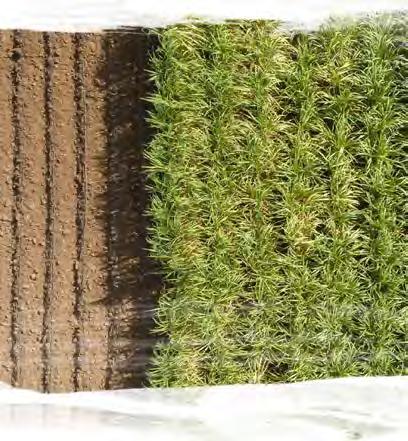
If you are currently experiencing the impacts of drought, Ms Finney said there may be loan options available to help with recovery.
“Our Emergency Drought Assistance Loans offer up to $50,000 interest-free to help primary producers who have been significantly impacted by drought to meet working capital expenses, including paying employee wages and buying goods like fuel to carry on the business,” she said.
“If $50,000 isn’t enough to get you back on your feet following dry conditions, more funding of up to $250,000 may also be available through Drought Carry-on Finance Loans.”
Wherever you are in Queensland, QRIDA has a network of Regional Area Managers nearby who can help you with the application process and answer any questions you have.
“They’re happy to meet with you on-farm at a time that suits to work with you to understand your business needs and answer your drought resilience and recovery questions,” she said.
To find out more about QRIDA’s drought support, visit qrida.qld.gov.au/droughtsupport or call 1800 623 946.
THE OFFICIAL MAGAZINE OF AUSTRALIA'S SUGARCANE INDUSTRY 20
Advertisement Authorised by the Queensland Government, Turbot St, Brisbane 1800 623 946 qrida.qld.gov.au /QRIDAmedia@we.are.qrida /QRIDAmedia/company/QRIDA
Find out more by scanning this QR Code or speak to your Regional Area Manager by calling 1800 623 946.
*The
information contained herein is for general information purposes only. You should not rely upon this information as a basis for making any business, legal or any other decisions.
QRIDA Natural Disasters and Drought Manager Sheree Finney says there are a range of financial options available from QRIDA to help cane growers prepare for dry conditions.



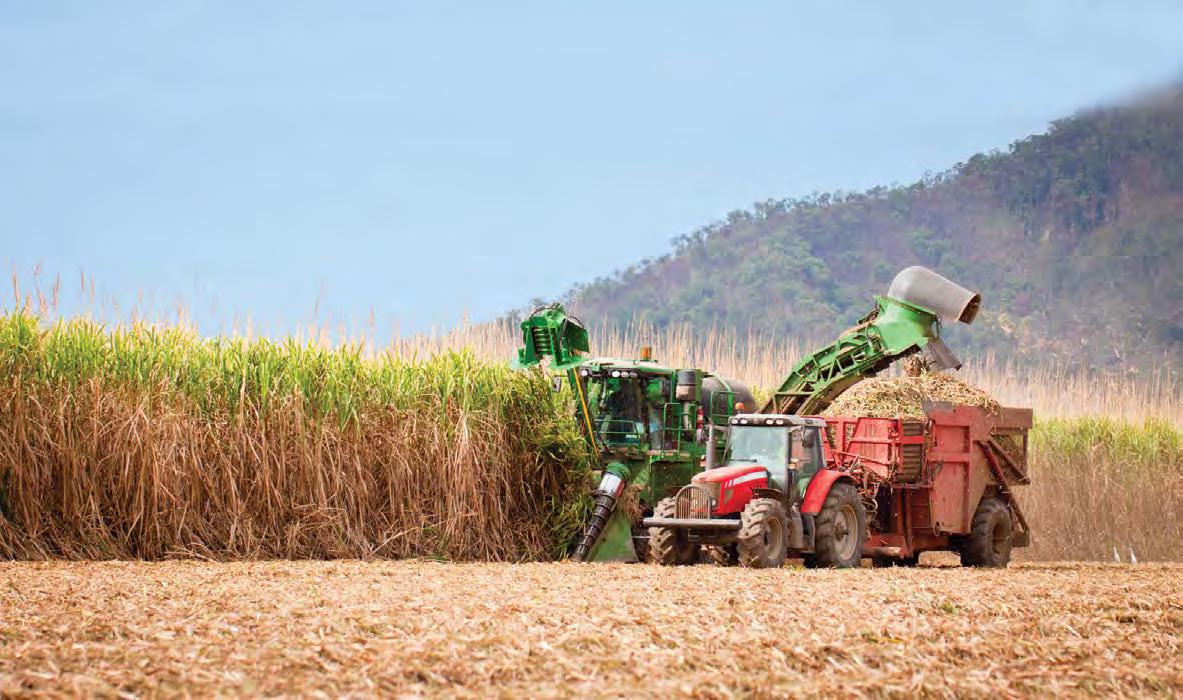

21 FEBRUARY 2023 – VOLUME45/NUMBER 2 EASY TO RUN LOW IN SPATTER CONSISTENT PERFORMANCE VALUE FOR MONEY LASTS LONGER LESS DOWN TIME THE LATEST HARD FACING TECHNOLOGY CC WELD SOLUTIONS Want to talk Hard Facing? Call us today! We solve your welding and wear problems. Phone today: 0413 700 175 | E: mick@ccwelds.com | www.ccwelds.com Your best choice for Hard Facing Wires & Electrodes QFF’s current 20 members are the peak industry bodies representing a broad range of commodities from cotton, sugarcane, horticulture, nursery and garden, through to dairy, chicken, pork, eggs and oysters. QFF advocates on behalf of our members on shared challenges and opportunities to support a strong future for Queensland agriculture. Queensland Farmers’ Federation To learn more about QFF or if you are a peak agricultural body and you’d like to find out how being a QFF member can assist your industry, contact qfarmers@qff.org.au. is the representative body for agriculture in Queensland. www.qff.org.au @QldFarmers Canegrowers Cotton Australia Growcom Nursery and Garden Industry Queensland EastAUSmilk Turf Queensland Australian Cane Farmers Association Queensland United Egg Producers Queensland Chicken Meat Council Pork Queensland Inc Queensland Oyster Growers Association Irrigator Groups across Queensland MEMBERS
RODENTS RAMPAGE
Conditions were described as a ‘perfect environment’ for rats to thrive.

THE OFFICIAL MAGAZINE OF AUSTRALIA'S SUGARCANE INDUSTRY 22
In the December issue of Australian Canegrower, Lawrence Di Bella, Manager for Herbert Cane Productivity Services Limited urged growers to monitor fields yet to be harvested for rat activity because of the large crop and the late finish to the season.
“High numbers of rats and significant crop damage has been observed across the Herbert cane growing region in the past few weeks,” Mr Di Bella said.
“The crop damage is at record highs with many in the industry saying it is probably one of the worst years for rat damage in decades.”
Conditions were described as a ‘perfect environment’ for rats to thrive.
Ingham growers Zenan and Michael Reinaudo are just two of the many growers experiencing this first-hand, with excessive cane loss due to increased rodent populations.
“A conservative estimate would put our losses at around 3 percent and that’s not including rat damage to standover cane for the upcoming season, in which some blocks may be unable to be harvested at all,” CANEGROWERS
Herbert River Director Zenan said.
“From the season’s perspective the breeding conditions has been optimal with the prolonged wet and lodged cane and rat populations exploding. In addition the prolonged length of the season last year meant the paddocks were available for the rats to breed in longer.”
Zenan and Michael estimate a $150,000 loss is a minimal figure for their crop and that is without including the upcoming season of standover cane, it’s a bitter pill to swallow after last year’s challenging season. Weather, mill issues and high input costs have taken their toll on business profitability.
“It’s been difficult to keep paddocks weed free and clean, with the inability to get in the paddock to spray
due to water logging,” Zenan said.
Zenan acknowledges the prospect of aerial spraying in managing and baiting the rats but recognised it’s an expensive option, moving forward it is something they may have to look at if the current situation continues.
“Maybe we would trial a small area to determine the costs, efficiency and if it would be a good option for us,” Zenan said.
This season some growers that haven’t previously experienced rat management issues are noticing impacts of the rodents in their crops, if this is the case contact the local productivity services team and CANEGROWERS district office.
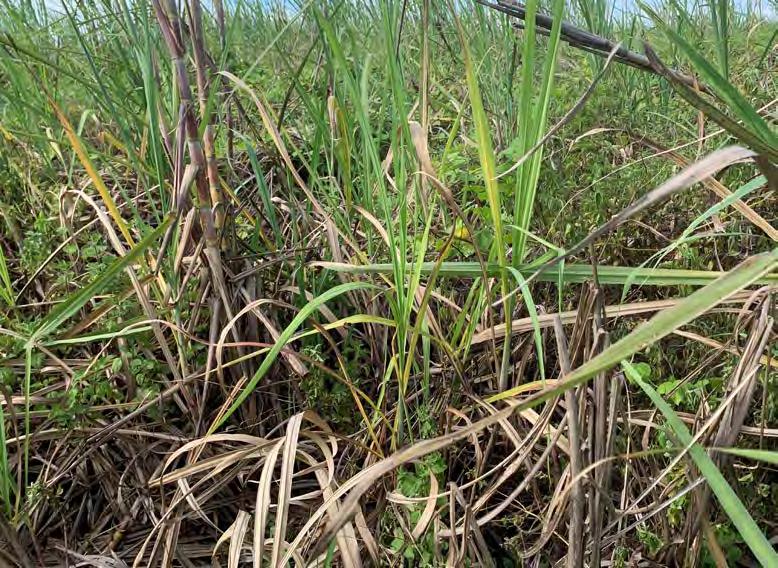 Damage caused by rats - Reinaudo farm
Damage caused by rats - Reinaudo farm
23 FEBRUARY 2023 – VOLUME45/NUMBER 2
“High numbers of rats and significant crop damage has been observed across the Herbert cane growing region in the past few weeks,” Mr Di Bella said.
ROAD TO LONGEVITY
By Renee Cluff
“I’ve seen a lot of changes.” After almost eight decades of growing cane, that comment from Innisfail’s Joe Cini might just be the understatement of the year. Among the wisdom he has acquired is a surety that nothing ever stays the same.
While Joe may not be the largest grower in the district, overseeing 120 hectares of cane land, he is one of the more progressive. He has had to be to withstand the challenges each decade has dished up.
From mill closures to economic downturns, the introduction of mechanised farming systems, cutting cane green instead of burning, sustainability pressures, encroaching development as well as mother nature’s floods and cyclones, Joe has experienced it all and along the way, his keenness to learn has never wavered, starting in the 1930s when he was involved in the district’s Young Farmers Club as a boy.
Joe’s full-time career began at the age of 15 in post-war 1946, when he left school to help manage the family farm.
His father, Maltese immigrant Liberato Cini, began farming in Japoonvale before buying a larger parcel of land where Joe continues to live today, on the outskirts of Innisfail. The property still has the old horse stables and cane cutter’s barracks, which slept six men. Today, the buildings act as shed space. The original house is more than a century old.
“He was a good farmer but he wasn’t up to date with machinery or anything like that,” Joe remembers of his father.
“Dad never drove a car, never drove a tractor. I used to do it all. I also worked with horses here and I did a lot of manual work. We didn’t mind it because we just had to do it. Then we had an old tractor - an old Fordson with steel wheels. It was noisy and that’s why I’m deaf now because of that thing screaming. There was no muffler on the exhaust.”
In the mid-1950s, his father passed away and Joe - the oldest of four children - took over the running of the farm, eventually purchasing it from his mother.
“Years went by and we were on rubber tyres and that was like a Rolls Royce to me.
“Every few years we’d buy another Massey Ferguson and then we started buying air-conditioned cab tractors, which was very good and I used to wonder how the hell I used to work without it.”
Joe gradually expanded his operation throughout the years, initially through the purchase of a cane assignment and then by buying a neighbouring property and the one beside it, initially in partnership with his brother George who later sold his share to Joe.
He also expanded his family, marrying Mary, becoming a stepfather and having
two more daughters. Their partnership has lasted well over half a century and is the most important collaboration in his life.
His stepson Barry and grandson Lachlan work the farm today. Joe not only recognises their potential but welcomes and seeks their input, which illustrates his leadership and philosophy of harnessing the talents of those around him.
“They have better ideas than me,” he said. “They keep up with the latest research and the latest technology.”
From an enterprise standpoint, the forging of other partnerships has been crucial to its endurance. In the 1960s, Joe paired up with a neighbour to buy their first mechanical harvester. Paddocks were re-designed to favour longer rows for less passes – a model that didn’t suit hand cutting and its heavy, portable rail lines. 20 years later, he and three neighbouring growers formed a harvesting and planting cooperative known as Sundown Farming. It’s allowed them to share,
"Joe’s full-time career began at the age of 15 in postwar 1946, when he left school to help manage the family farm"
THE OFFICIAL MAGAZINE OF AUSTRALIA'S SUGARCANE INDUSTRY 24
26
“I HAD TO LOOK AFTER MY BROTHERS AND SISTER AND MUM.”
Continued page
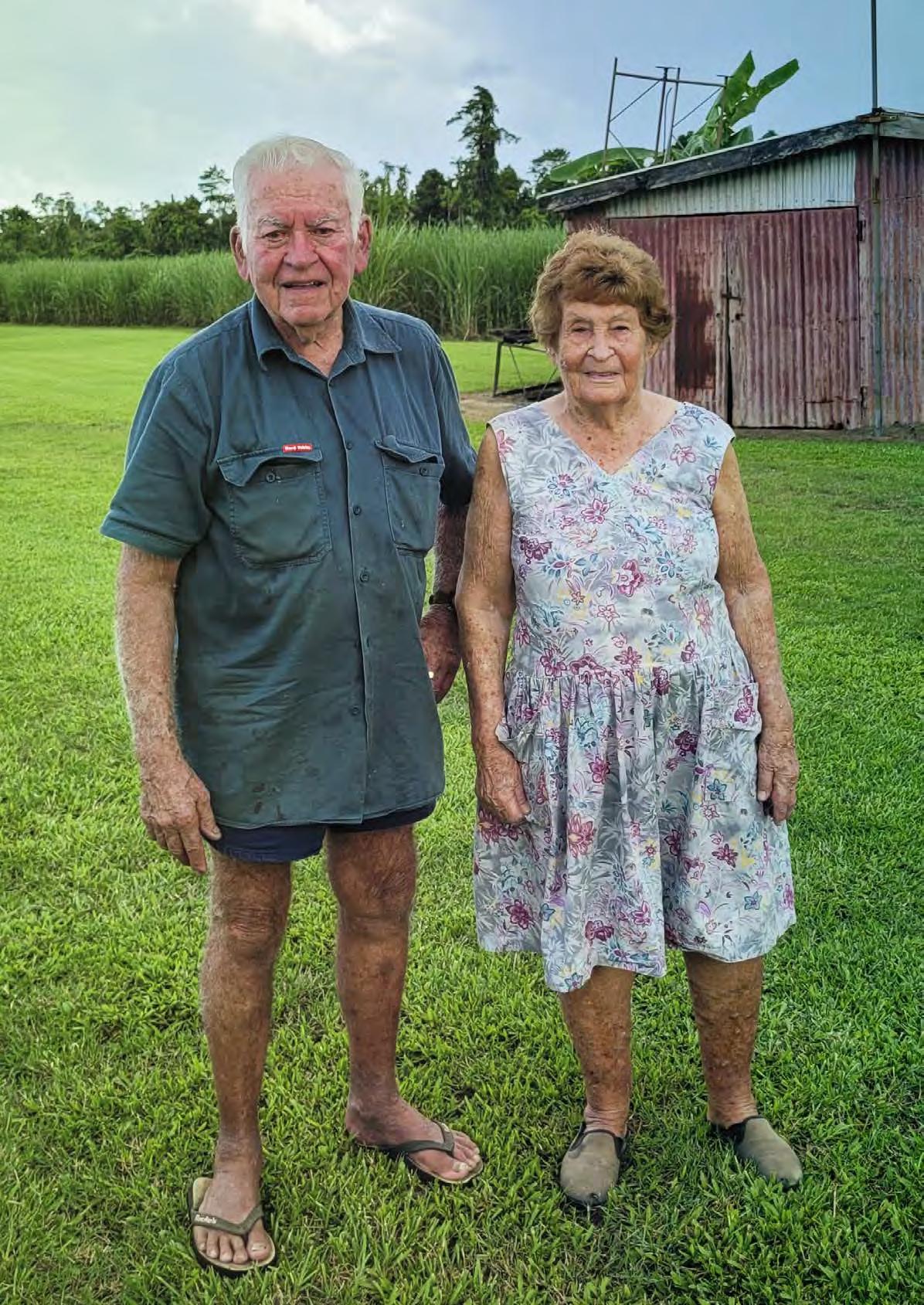
maintain and update machinery assets while working as a team on each of their farms during harvesting season. The collaboration remains strong to this day.
“We buy in combination with the group and we can buy better harvesters that way,” Joe explained. “They are getting too expensive for individual growers.”
In more recent years, Joe has embraced environmental initiatives. He welcomed the end of burning cane in favour of cutting green and with his farm boundary consisting mostly of a creek line, he has been heavily involved in water quality projects, including the Wet Tropics Major Integrated Project.

He’s well aware of the importance of the environment and the climate. During his farming career, his land has been hit my
multiple tropical cyclones, including the more recent cyclones Larry and Yasi.
“It’s a disaster when you get a cyclone, they do a lot of damage,” he said. “Do you know how many times my little shed has finished up in the paddock? The roof lifts off and gets dumped. Then we go and pick it up and bring it back and put it back up again.”
Flooding has in the past washed out a transport bridge, while brackish water rising from the tidal creek has damaged the crop. That’s despite the existence of flood gates that were built by hand by Joe in the early years.
However, what weighs most on Joe’s mind is development, with his farm earmarked for a new bypass road skirting Innisfail.
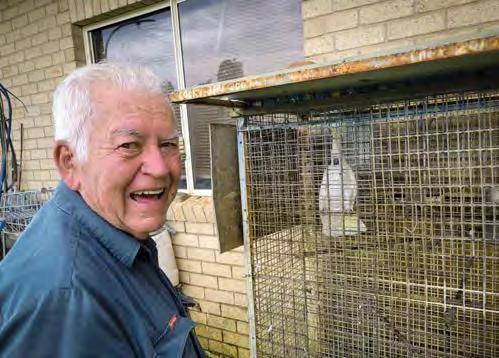
MILLS JOE HAS SUPPLIED Goondi Mill –closed 1986 Mourilyan Mill –closed 2006 Babinda Mill –closed 2011 South Johnstone & Mulgrave Millcurrent
THE OFFICIAL MAGAZINE OF AUSTRALIA'S SUGARCANE INDUSTRY 26
“Growing cane is in me. I just can’t get out of it”
He’s been worried about compulsory acquisition of his cane land for more than six decades. “60 or 70 years ago they first came and surveyed,” he said. “I couldn’t sleep at night the first time they came up. I couldn’t understand it because it would be close to our residential property too. They’ve come up again with the idea recently and they’re doing surveys again, but they can’t make up their mind which way they’re going to go.”
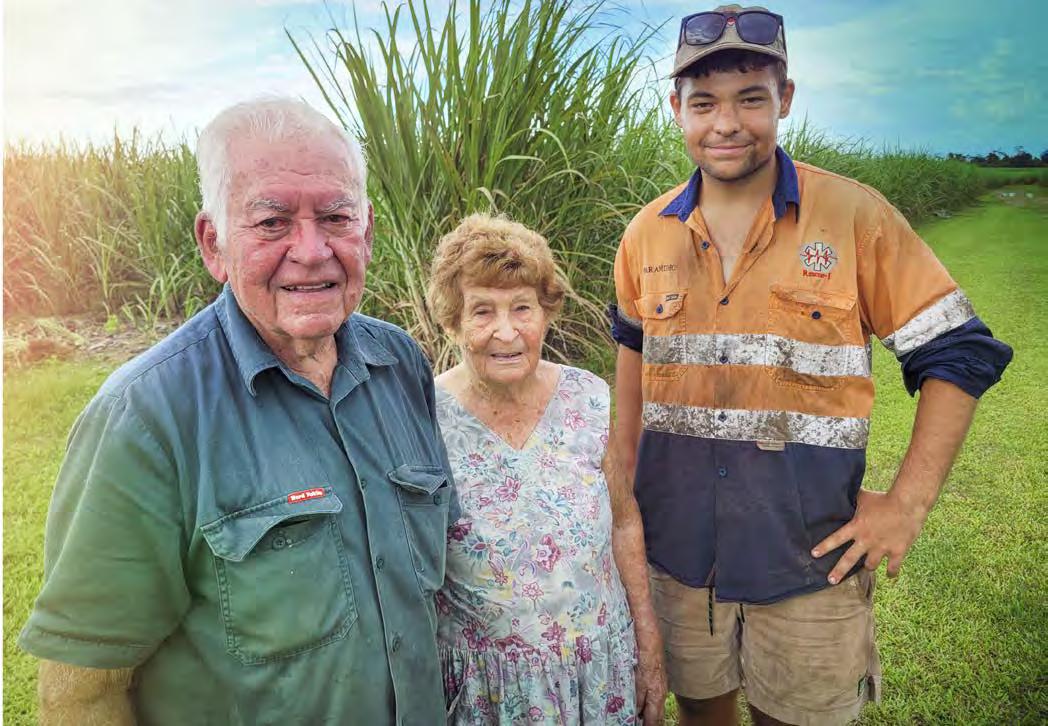

Joe loves his land and knows every square inch of it intimately. He still traverses the farm every morning on his quad bike, checking everything is as it should be.
If the past is any indication of what the future might hold, Joe has his own theories. “Who knows? One day in the future they might make juice in the paddock before they send it to the mill. I don’t know, it could be!” As cane fibre products growin value, it’s a crystal ball prediction that’s certainly plausible.
Joe Cini with his wife Mary and grandson Lachlan
27 FEBRUARY 2023 – VOLUME45/NUMBER 2
Joe’s sister, Mary Rose, volunteers at the Australian Sugar Heritage Museum in Mourilyan.
SHARING THE SUGARCANE STORY
CANEGROWERS continues to showcase the industry to agriculture teachers and recently attended the 2023 National Agricultural Educators Conference, presented by the National Association of Agricultural Educators (NAAE) and Queensland Agricultural Teachers Association (QATA) in Toowoomba.
140 teachers from around Australia participated in hands-on workshops and industry tours showcasing innovative approaches to agricultural education and CANEGROWERS Project Coordinator Shikira Kalatzis was available to shine the light on growing sugarcane.
Through the CANEGROWERS membership of the Primary Industry Education Foundation Australia (PIEFA) a curriculum-aligned educational resource called One Plant, Many Products has been developed to
take students from Years 5-8 on the journey of growing sugarcane, to cane production, milling onto the sugar production and valueadding of the product.
CANEGROWERS is also working with PIEFA on a further secondary resource to assist agricultural teachers, wherever they are, to understand the industry as a whole and encourage potential career pathways for older students to explore.
“The sugarcane industry plays a vitally important role in many communities in Queensland, there are many
opportunities for young people to get involved in the industry,” PIEFA CEO Luciano Mesiti said.
Schools and teachers are expected to meet the requirements of a national curriculum and valuable resources that are aligned can make life easier for the teacher in their lesson planning.
“CANEGROWERS is proud to sponsor and attend the 2023 National Agricultural Educators Conference,” Shikira said.
“It’s great to see teachers and industry groups coming
together to discuss future opportunities to teach agriculture.
“And put the spotlight on the many career opportunities available to students.”
Agriculture is a vibrant, valuable and practical industry that is integral to Australia and to the world and there are lots of career pathways and opportunities available to students within the sugar industry.
THE OFFICIAL MAGAZINE OF AUSTRALIA'S SUGARCANE INDUSTRY 28
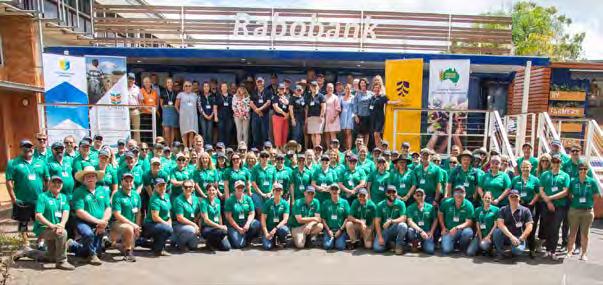

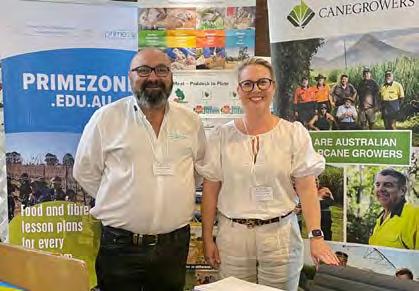
29 FEBRUARY 2023 – VOLUME45/NUMBER 2
Isabella Lee and Nikita Fenton from Capella State High School with the CANEGROWERS bags are excited to learn more about sugarcane
2023 NAAE Conference participants
PIEFA CEO Luciano Mesiti and CANEGROWERS Shikira Kalatzis sharing the sugarcane story
SHARED VALUE RECOGNISED
By Kate Gowdie
The importance of the Smartcane BMP program to the cane growing industry has continued to grow since the inception of the program in 2014.
The value of Smartcane BMP is recognised not only by growers but also throughout the value chain and the greater agricultural industry. The Queensland Government has also recognised the value of the program through several rounds of funding that has gone to directly supporting the critical role of
the regional facilitators.
The past funding has recognised that accreditation in the Smartcane BMP
program remains an alternate pathway to compliance under the Queensland Government’s Reef Regulations. Smartcane BMP standards meet or exceed government regulations and are backed by industry best science and practice.
The Queensland Government has recognised the contribution of Smartcane BMP accredited growers
to Reef Water quality outcomes and has invested in the program to support the ongoing benefits to reef water quality and sustainability, more broadly.
Interest in sustainably sourced sugar continues to grow and the Queensland sugar industry is best placed to meet the demand through the availability of sugar sourced from Smartcane BMP accredited enterprises. With the program’s credentials aligned to several international standards, Smartcane BMP’s
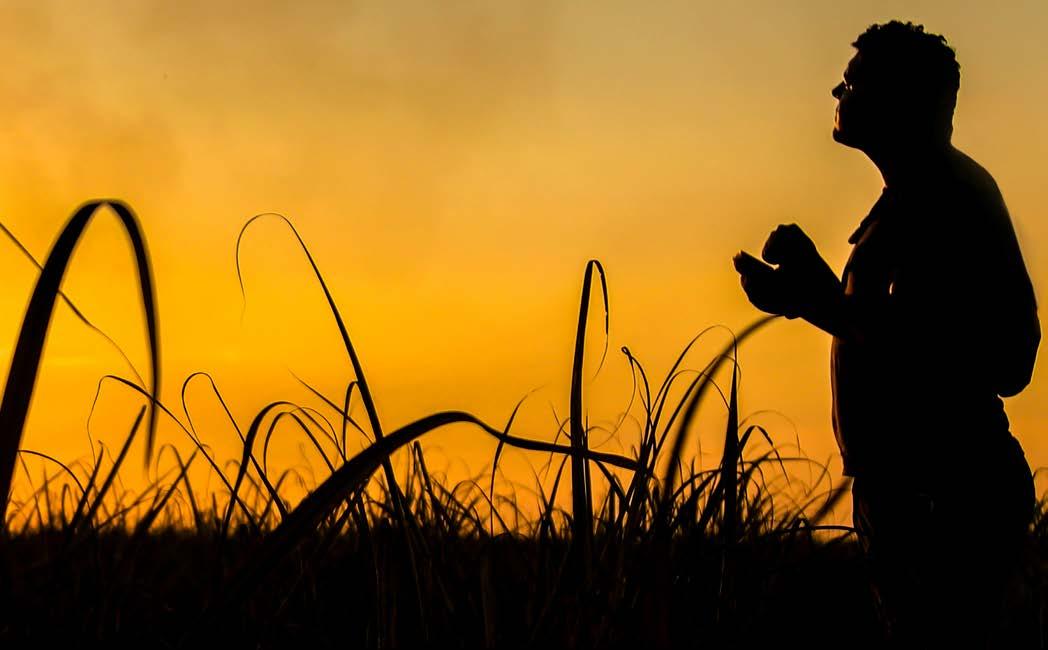
THE OFFICIAL MAGAZINE OF AUSTRALIA'S SUGARCANE INDUSTRY 30
The Smartcane BMP project (2022-2026) is delivered by CANEGROWERS with funding from the Queensland Government’s Reef Water Quality Program and CANEGROWERS.
"Interest in sustainably sourced sugar continues to grow and the Queensland sugar industry is best placed to meet the demand"
AUDIT (3RD PARTY)
ACCREDITATION 5 YRS
SURVEILLANCE / REACCREDITATION AUDIT 1-5 YRS
REGISTRATION
Yet to register?
Visit www.smartcane.com.au and click on the Register tab on the home page or call your local Smartcane BMP Facilitator.
SELF ASSESSMENT
Completed your self-assessment and are now benchmarked?
Do you need to update your assessment?
robustness and integrity is recognised widely throughout the sugar value chain.
The Smartcane BMP program was proudly developed by industry, for industry. CANEGROWERS has also invested in the program which demonstrates the importance and value of the program to the entire industry.
40% of Queensland’s cane area has been verified as meeting industry best practice, voluntarily through Smartcane BMP accreditation.

Perhaps the greatest investment in
Access the grower home page of the Smartcane BMP website or contact local Smartcane BMP Facilitator for assistance.
NEED HELP?
Working towards accreditation but unsure how to proceed?
Contact your local Smartcane BMP facilitator to help you reach your goals. Facilitators can provide you with record keeping tools and other resources to help you achieve accreditation.
ACCREDITED
Have you considered benchmarking your business against the Smartcane BMP non-core modules?
Visit the grower home page of the Smartcane BMP website or speak to your facilitator to find out more.
the program has come from growers. The efforts of growers to-date in demonstrating their commitment to the long-term viability of our industry cannot be understated.
The Smartcane BMP program recognises the over 700 enterprises currently accredited in securing our industry’s sustainability credentials and contributing to our social licence to operate.
Growers’ who are yet to verify their onfarm best management practices are
invited to participate and ensure they too receive recognition for their efforts and can share their credentials with the world.
Visit the Smartcane BMP website or contact your local facilitator to learn more about the Smartcane BMP accreditation pathway.
The Smartcane BMP project is delivered by CANEGROWERS with funding from the Queensland Government's Reef Water Quality Program and CANEGROWERS.
SELF ASSESSMENT PRE AUDIT REGISTRATION 31 FEBRUARY 2023 – VOLUME45/NUMBER 2
CANEGROWERS REGIONAL ROUND-UP
Supplied by CANEGROWERS district offices
Mossman Mill ultimately stopped crushing on Friday 23 December due to wet weather conditions and lack of road transport it was decided not to restart after the Christmas break. The final cane processed by Mossman Mill was 754,403.03
MOSSMAN CAIRNS
The whole of the region has received a fair dousing of rain with the catchments now full.
There have been some success stories around the Yellow Crazy Ant Program
tonnes with 478.05 tonnes of cane being condemned on the coast. The final mill average was 12.07CCS which reflects the disappointing season.
The coastal growers supplied 481,156 tonnes of cane for an average of
11.4CCS and the Tableland growers supplied 273,247 tonnes of cane for an average of 13.24CCS. Due to the earlier than expected finish date there was about 15, 300 tonnes of cane left stood over on the Tableland. Mossman Mill and the Bargaining

Agents met on 6 January to discuss the potential for some compensation consideration for those growers affected with standover cane.
with a total of four sites being eradicated in the Wet Tropics Area.
Early next month some local canefarmers have accepted the invitation from MSF Sugar to attend
a Grower Study Tour to Thailand. We look forward to hearing about their adventures and learnings.
CANEGROWERS Cairns
Region is currently organising a second trip
to Brisbane by the Young Grower Group, here again, we look forward to hearing about their experiences.
THE OFFICIAL MAGAZINE OF AUSTRALIA'S SUGARCANE INDUSTRY 32
At the time of writing, the Innisfail district is experiencing reasonable growing conditions. Below average rainfall in January has been welcomed, breaking the very dry conditions experienced in October and November.
CANEGROWERS Innisfail is looking at strategies to improve the long-term sustainability of the local industry.

The Tully district completed the 2022 crushing season on Friday 16 December with zero standover and a total of 2,879,289 tonnes harvested. This is the third largest crush on record for the Tully Sugar Mill.
The season final stats resulted in an average ccs of 12.27 and average yield of 98 tonnes per hectare.
The Tully Variety Management Group held its annual end of season meeting at Fernlee Farming
on Thursday 15 December. The meeting was well attended by growers and industry members, pictured, who took the opportunity to discuss the season results and comparisons to previous crushing seasons.
Chemical Training will be held this month under Smartcane BMP and planning is underway for CANEGROWERS Business Essentials workshops to be held in Tully in midFebruary.
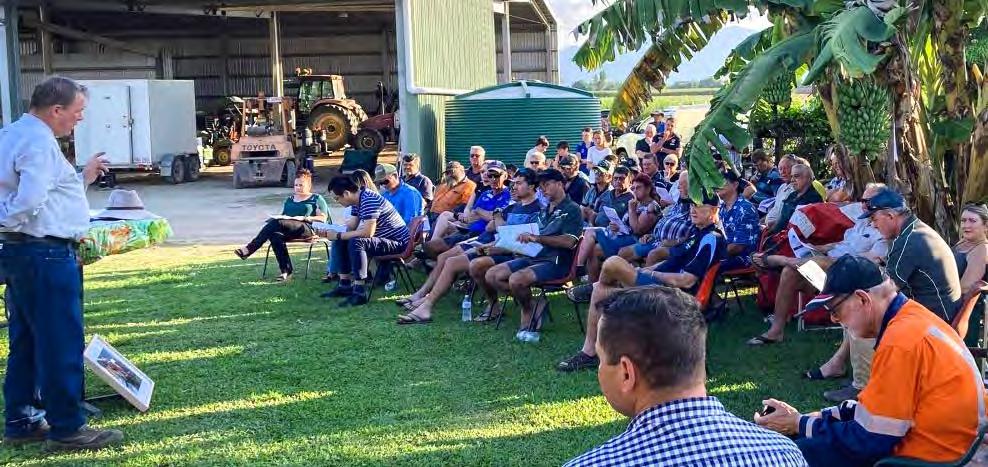
33 FEBRUARY 2023 – VOLUME45/NUMBER 2
INNISFAIL TULLY
Photo credit Diane Machan
HERBET RIVER
The Herbert River district crushed a total of 4.53 million tonnes with the season CCS finishing at 11.59CCS. The last crushing day was 22 December and the district lost over 30 days of crushing due to rain. There were also several days lost due to poor mill reliability and mill breakdowns throughout the season.
On 19 January, Canegrowers Herbert River held a meeting for all members to review the 2022 season, pictured, and discuss the issues which contributed to the poor season outcomes.

We had over 90 members and we would like to thank all who attended.
The third round of the Major Grants Project will be opening in the Herbert River district on Monday 30 January and will close on Friday 3 March. This has been a successful project to date as there has been approximately $1.15 million granted to growers in the district to purchase eligible equipment which will assist them to uptake best practices.

THE OFFICIAL MAGAZINE OF AUSTRALIA'S SUGARCANE INDUSTRY 34
The 2022 season officially finished in January with the last bin tipped on 7 January, or as one wag quipped, we have already started the 2023 season! For the record, the 2022 season delivered 8,213,611 tonnes of cane and a CCS of 13.61 compared to an original budget of 7,940,000 tonnes, CCS of 14.68 and an anticipated finish date of 23 December 2022. There were decent misses all-round here.
It really wasn’t the finish date we wanted when compared to the CSA goal of 21 November for ratooning purposes and nor did some growers want to finish on 7 January, as they still had burnt and green cane in the paddock which they wanted to get off when Wilmar made the call to close the last mill after higher than forecast rains were received.
On the flipside, it was a hard season and some growers and contractors had simply had enough and were willing to cut it short despite cane being left behind. Standover cane totalled 1,134 hectares.
For CANEGROWERS
Burdekin (CBL) members, growers left with involuntary cane in the paddock, there is a compensation pool, in the CBL CSA, for involuntary standover payable by Wilmar in the July wash up pay and further details will be provided once the involuntary tonnages have been calculated with Wilmar.

What were the key learnings from the 2022 season?
Fantastic sugar prices have hung around a lot longer than anyone expected, it’s a significant challenge to recruit and keep seasonal staff, the silent tax called inflation has increased the cost of doing business and Wilmar need to do better in terms of mill performance, optimising district crushing capacity via cane transfer, communication and managing equity. The 2023 season is off to a wet start with a significant amount of rainfall received. Whilst the crop looks good in some areas, there is concern that the crop size for the 2023
season may be lower due to the late 2022 season finish which resulted in growers ratooning cane late, not ratooning some blocks and increased fallow. Time will tell what mother nature and the humans will have ready for us for the 2023 season.
Growers are reminded that if you want to change harvesting groups, you need to have the application forms to change groups into Wilmar on or before 28 February. If growers are in the process of buying or leasing a farm and the transaction won’t settle until after 28 February and you want to change harvesting groups for the new farm for the 2023 season, you need to let Wilmar know even if the transaction hasn’t settled, as they may be able to accommodate this change with sufficient notice.
It’s also that time of year to order seed cane and BPS have advised that seed cane orders can only be guaranteed if they are submitted by 28 February. All orders submitted by this date will have first priority,
and if demand exceeds available supply, BPS will allocate based on hectares of BPS levies paid of those who submitted orders. Please note that some varieties are in short supply such as SRA23 and possibly Q183.
In terms of services to members, please note that Mindi Lennon is available to help with your N&P Budget and CBL will also be assisting members to calculate their cost of production which would be beneficial for marketing decisions and business planning and if growers would like to know what their cost of production is and the process to calculate this, please contact Michelle Andrews.
35 FEBRUARY 2023 – VOLUME45/NUMBER 2
BURDEKIN
PROSERPINE
With the last cane delivered on 11 January, the mill finished with 1.85 million tonnes at an initial recorded estimate of 13.56CCS. This was 210k tonnes higher than the previous season. Despite the extended crush, the average CCS remained above 10.4 in the last week which was a welcome relief despite a difficult end to the season
The end of the season
also marked the end of an era with Michael (Mike) Porter retiring after 14 years of service with CANEGROWERS
Proserpine. He will be sorely missed by growers and staff alike. Brendon Nothard has been appointed to his position.
Heavy rains fell during the second and third week of January with much of the Whitsunday Region remaining inundated during this time. Roads
were closed in a number of areas including the Bruce Highway in the Googanga Plains area. Initial reports of over 1,000 mm of rain falling between the 12 and 17 January in some areas, abnormally high even for this time of the year.
The CANEGROWERS
Proserpine Board had their first meeting for 2023 on 23 January and look forward to leading the organisation through the coming season. There is
the aim for an earlier start, but this will depend on how off-crop mill maintenance and repairs progress in the coming months.
A long and challenging crush has finally come to an end in the Mackay and Plane Creek milling areas.
In-season growth, driven by unseasonal winter rain and warmer temperatures, led crop estimates to escalate across the season. In Mackay, the estimate started at 5.1Mt and finished at 5.9Mt; in Plane Creek, numbers went north from 1.3Mt to around 1.6Mt. The crush ran a marathon 30 and 31 weeks in the two mill areas respectively.
Factors around wet conditions, including mud and cane supply issues, ended the crush in each area earlier than the millers had suggested, with Mackay Sugar ending 2022 with a plan to cut until the end of January if fine conditions had prevailed. Plane Creek crushed out on 7 January, while Mackay Sugar ended on 13 January. There remains substantial standover in both areas: an estimated 153,000 tonnes across Plane Creek, and a steep 370,000 - 400,000 tonnes across the Mackay
district. Some growers are reporting individual standover of 20% of their crop.
Clearly this will offer crop cycle and management issues for many members, and we encourage them to reach out to their agronomists and support services. Cane beetle and rats have been an issue in standover from 2021 and will remain so.
Looking forward, we encourage members who have not previously taken part in CANEGROWERS
Business Essentials
workshops to enroll in the course planned for Mackay on 28 February – 1 March. Succession planning is now included, and participants in previous courses are welcome to sit in for this individual module. To register, you can find the links in your emailed CEO Updates or look at the Business Essentials page on the CANEGROWERS website.
Any growers requiring assistance with any issues are encouraged to call 4944 2600.
THE OFFICIAL MAGAZINE OF AUSTRALIA'S SUGARCANE INDUSTRY 36
MACKAY
BUNDABERG
The 2022 crushing season finished on Saturday 31 December crushing a total of 1,085,479.36 tonnes for the season.
Approximately 71,000 tonnes, of which 33,000 tonnes was grower cane, was left as standover mainly due to a total of 28.5 days lost to wet weather throughout the season. The season
average CCS was 13.15 which was disappointing although understandable considering the continued wet throughout the season. The core season ended on Friday 24 December with an average CCS of 13.22.
Our assessment was that mill availability was approximately 95% which puts Millaquin in high performance when compared with others in the
state. Road transport and in particular the multilift system caused a lot of issues for growers and their contractors and we will be attempting to ensure that this doesn’t happen in the 2023 season, similarly the amount of cane not crushed within 24 hours was higher than is acceptable. At our recent Board meeting Directors met with representatives of QSL to
receive a market update for the 2022 Season, forecast for the 2023 season and progress on the transition to an SMA including access to QSL Direct.
Directors met with growers on 25 January to review the 2022 season, if you were unable to attend and would like to find out what was discussed please contact the office on (07) 4151 2555.
The last bin for the 2022 crushing season was tipped just after 9:40pm on Monday 9 January.
Isis Mill crushed 1,422,854 tonnes over 31 weeks which is the second highest
MARYBOROUGH
The end of a long season was finally reached 10 January and covered 31 weeks!
The combined cane supply through Isis Mill reached over 1.42 million tonnes with 566,343 tonnes from Maryborough District. Unfortunately not all cane could be harvested with
seasonal throughput in the mill’s history. The seasonal average unit of CCS of 12.75.
Isis growers supplied 860,121t which was around 20,000t over the around 72,000 tonnes still in the field.
CCS stayed above the base set at season start and finished at 12.87.
This brings to an end two years of toll crushing and operations under MSF Sugar. The CANEGROWERS Maryborough board has
district estimate and there is still a little standover left in the Wallaville and Childers areas. An accurate calculation of standover is currently being undertaken.
The district has seen some
patchy rain over the past few weeks and more would be welcomed as everyone prepares to dust off their irrigators. Those that were able to get peanuts in, have a sensational looking crop.
been in negotiations with Isis Mill for a CSA for a number of months now while the sale of the Maryborough Mill site has been slowing. The news this week is that the contracts have now been terminated between MSF sugar and AEG and our future is with Isis Central Sugar Mill.
By the time this magazine is printed we expect to have a CSA for growers to consider for 2023 and beyond with Isis Central Sugar Mill and we look forward to building a prosperous future for all.
37 FEBRUARY 2023 – VOLUME45/NUMBER 2
ISIS
ROCKY POINT
At the end of week 12, 14 January 2023, the Rocky Point Mill had crushed a total of 141,538 tonnes of cane at a seasonal average CCS of 13.42. Since the start of the season on 29 October, CCS has dropped 1.4 units – we anticipate the sugar to continue to fall.
Since the last Regional Roundup, we have had more days off than crushing, we ceased harvesting on 21 December
for the Christmas shutdown - 1.5 days earlier than what had been scheduled, due to mill issues.
Over the Christmas period we stopped for 13 days and then restarted again on 3 January. The Mill ran for 2 days then had to shut down again for 6 days due to further issues.
Our growers have become so frustrated as to how poorly the mill operation is running, and the no urgency
by the miller to get the crop off. Here we are in January and still harvesting two year old cane!
At writing this report we have only supplied 38% of the total estimate and filled 55% of our priced sugar positions.
At least the weather has been in our favour to this point, we plan to keep crushing for as long as possible, until early February.
On a positive note, some growers have managed to plant soy beans, some opting not to plant cane on their fallow from last year but double up on soy. At least we can get that crop harvested!
We have a SRA/ CANEGROWERS Rocky Point pachymetra survey happening during the week 15 - 20 January, to establish the level of the disease across the district.
It’s never too early to start planning for succession. In fact, the longer the horizon, the more time to walk your business forward.
Join us with solicitor Kylie Wilson, Partner at Holding Redlich law firm and benefit from her professional experience as we explore this complex topic! Workshops start in February 2023. Register your interest today!

THE OFFICIAL MAGAZINE OF AUSTRALIA'S SUGARCANE INDUSTRY 38
CONSIDERING YOUR OWN ASPIRATIONS AND NEEDS CONSIDERING ALL OF THE FAMILY MEMBERS AND PARTNERS ASPIRATIONS BALANCING EQUALITY AND EQUITY SUCCESSION PLANNING IS INCLUDED IN THIS YEAR’S CANEGROWERS BUSINESS ESSENTIALS WORKSHOP. This program is jointly funded through the Australian Government’s Future Drought Fund and the Queensland Government’s Drought and Climate Adaptation Program.
www.canegrowers.com.au
Have your say on quad bike safety
Have your say on quad bike safety
Do you ride a quad bike or know someone who does?
Do you ride a quad bike or know someone who does?
Have your say on quad bike safety.
Have your say on quad bike safety.
DO YOU RIDE A QUAD BIKE OR KNOW SOMEONE WHO DOES?
For too long, quad bike users have been overrepresented in serious injury statistics. Sadly, more than fifty Queenslanders have been killed using quad bikes since 2011.
For too long, quad bike users have been overrepresented in serious injury statistics. Sadly, than fifty Queenslanders have been killed using quad bikes since 2011.
Have

your say on quad bike safety.
Share your thoughts about quad bike safety in Workplace Health and Safety Queensland’s confidential 15 minute survey. This survey will help us to understand the behaviours and beliefs of people who own or use quad bikes for work, recreation or any other purpose.
Share your thoughts about quad bike safety in Workplace Health and Safety Queensland’s confidential 15 minute survey.
For too long, quad bike users have been over-represented in serious injury statistics. Sadly, more than fifty Queenslanders have been killed using quad bikes since 2011.

This survey will help us to understand the behaviours and beliefs of people who own or use quad bikes for work, recreation or any other purpose.
Have your say by Monday 27 February 2023.
Share your thoughts about quad bike safety in Workplace Health and Safety Queensland’s confidential 15 minute survey.
Have your say by Monday 27 February 2023.
This survey will help us to understand the behaviours and beliefs of people who own or use quad bikes for work, recreation or any other purpose.
Have your say by Monday 27 February 2023.
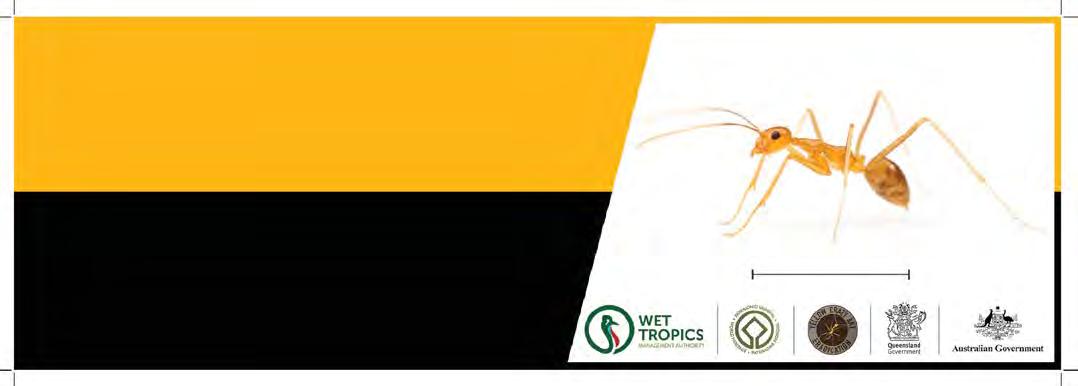
39 FEBRUARY 2023 – VOLUME45/NUMBER 2
Workplace Health and Safety Queensland
Workplace Health and Safety Queensland
REACHING GOALS IN 2023? CANEGROWERS CAN HELP!
Membership Engagement & Innovation
MATT KEALLEY

The fireworks have dazzled, the decorations have been put away, and the 2023 resolutions set with the best of intentions have lost a little focus. February is upon us and I’m sure you’re saying to yourself “Wow –where did January go?”
February is a good time to reacquaint yourself with the many benefits CANEGROWERS offers to support your business. What goals have you set for 2023 and how can CANEGROWERS help with your intentions?
• L OCAL SUPPORT – Your local CANEGROWERS district office provides you with support that is tailored to local needs and priorities – such as farm business management, mill supply, productivity and local community engagement.
• M EMBER BENEFITS – CANEGROWERS member benefits include excellent deals on farm inputs and health insurance from BOC and Queensland Country Health Fund, reciprocal member benefits from QFF and access to workplace health and safety guides, cost of production tools and general insurance.
• C ANE SUPPLY AGREEMENTS – as your bargaining agent, CANEGROWERS will seek the best terms and conditions from your sugar milling company. Your local district team is backed up by the wider CANEGROWERS expertise and experienced legal counsel.
• C ANEGROWERS CROP INSURANCE – members are automatically covered for loss of crop due to accidental fire, transit, or hail up to a rate of $35 per tonne.
• LE GAL ADVICE – you have access to free initial legal advice through CANEGROWERS in house legal advisor.
• M ARKETING INFORMATION SERVICE – this independent service provides members with information, education and expert insight on sugar price and production forecasting. You also have access to a tailored sugarcane farm Cost of Production Tool to help with marketing and forward pricing decisions.
WHAT’S HAPPENING IN THE NEXT FEW MONTHS?
If there is one thing I have learned at CANEGROWERS over the years, it’s that the February to May period is a good time for engagement, as growers have more availability. “The slack” has become busy with many organisations planning and holding meetings to take advantage of the quieter months.
Here are a few of the events coming up that would be well worth checking out.
CANEGROWERS BUSINESS ESSENTIALS –FIRST ROUND FEBRUARY AND MARCH
Make this year the time to reassess and focus on where you want your business to go!
CANEGROWERS Business Essentials program provides hands-on tools for growers, with flexible self-paced online learning, plus half-day, face-to-face workshops. The series of workshops are run by highly experienced farm economists, sugar marketing and risk specialists, and solicitors skilled in succession planning.
Workshops start in February 2023.
To register your interest in workshops head to the Business Essentials page on the CANEGROWERS website and fill out the form on www.canegrowers.com.au/business-essentials. Cost is $110 (including GST) per participant and all cane growers, family members and farm employees are welcome.
MEMBERSHIP MEETINGS – FEBRUARY TO JUNE
CANEGROWERS is holding member meetings across the cane growing districts between February and June 2023. These meetings have been well received over the past few years and are a great opportunity to hear the latest about industry trends, the work CANEGROWERS is doing on your behalf, and to come together for a chat.
CANEGROWERS Chairman Owen Menkens, CEO Dan Galligan, and members of the QCGO Board will attend these meetings, the first one of which is scheduled for Mossman and Tableland in February. More details to come.
PROJECT CATALYST – 19-21 FEBRUARY
The Project Catalyst Annual Forum will be held in Cairns on 19-21 February 2023. The forum will showcase grower trials advancing best practice to support productivity and environmental outcomes and provide an opportunity to network and listen to growers discuss their research and ideas.
AUSTRALIAN SOCIETY OF SUGAR CANE TECHNOLOGISTS (ASSCT) - 18-21 APRIL
The 44th ASSCT Conference will be held in Cairns between 18-21 April 2023. The theme for the conference is “Working together, growing together”. Growers are encouraged to attend the event which will include a field day, manufacturing and agricultural sessions with technical and research papers furthering the sugarcane industry.
THE OFFICIAL MAGAZINE OF AUSTRALIA'S SUGARCANE INDUSTRY 40
MASTER OF YOUR OWN DESTINY Industry
& farm Inputs
BURN ASHBURNER
BALANCING SORT TERM AND LONG TERM ISSUES
CANEGROWERS Farm Input and Research Committee will hold its first meeting of 2023 this month. This will provide an opportunity for committee members to more fully understand and discuss relevant policy issues in order to make recommendations to the Policy Council.
Some of the immediate issues facing the industry include attracting and retaining workforce, understanding the fertilser supply chain, and the cost of poor mill performance. There are also a number of longer-term issues which determine the strategic direction of the sugarcane industry.
The Sugar Plus Roadmap provides an industry strategic vision. Implementation is a whole of industry responsibility and CANEGROWERS needs to fully understand their role. More specifically the Farm Input and Research committee will look at what to recommend to the Policy Council. This will guide the organisation’s priority strategic direction and enable the creation of action plans.
Sugar Plus has three main themes (set out below) each of which can be addressed in parallel but with different timeframes for results.
BETTER BUSINESS AS USUAL
The Sugar Plus vision is “Striving for ‘better business as usual’ whilst improving utilisation of existing assets with increased sugarcane volumes and sugar output”. This deals with increased productivity on farms, increased efficiency and reliability of the mills and the supply chain.
As long as I’ve been in the industry (only 21 years) there seems to have been an underlying belief that growers as a whole could be more productive (average tonnes cane per ha) particularly if they all adopt current known best practice i.e. lift the bottom 50%.
Adoption and increasing farm productivity is a critical issue with significant industry investment and focus with SRA, Productivity Services, CANEGROWERS and millers over many years. However there has been no substantial increase in productivity.
Arguably, the underlying belief was that millers were well managed, profitable and stable. However, given mill
reliability issues under Sugar Plus better business as usual there will also be focus on whether millers are meeting best practice as is expected of growers.

Better business as usual is clearly complex however if we don’t do anything different can we expect anything to change? What to do differently is the challenge.
ADDING VALUE ACROSS THE INDUSTRY
The Sugar Plus vison is “Expanding horizons through new added-value products, in order to generate better returns and create new revenue streams to diversify risk”.
Sugar Plus goes on to say “Within 5 years new policies implemented and pilots built. First projects reach financial close, supported by catalytic infrastructure investment. First major projects enter production, and scale-up planning begins”.
We know we have many of the requirements for success (efficient biomass producer, infrastructure, technology, growing demand, government focus, and investors, to name a few. It is putting these together which will find the viable option.
For CANEGROWERS the challenge is to be at the table to provide leadership and ensure feedstock producers are part of the deal to add value to growers.
BIOECONOMY, WITH OPPORTUNITY FOR BOTH CURRENT AND NEW STAKEHOLDERS
The Sugar Plus vision is “Potential for substantial expansion of the industry as the backbone for Australian bioeconomic superhighway – so long as environmental and ecological sustainability can be assured. This will require significant government policy support and offers opportunities both for existing and new industry stakeholders”.
The bioeconomy offers an enormous opportunity. This is longer term and could change the face of the industry.
Sugar Plus goes on to say “Scale-up phase: Major projects have demonstrated commercial viability and expansion of the bioeconomy is gaining momentum. Sugarcane production could exceed 40m tonnes by 2030”.
The more immediate challenge is to set the policies now which will allow this to happen and not be overtaken by the demand and competition. Again, CANEGROWERS must be at the table.
41 FEBRUARY 2023 – VOLUME45/NUMBER 2
BIOSECURITY – KEEP IT FRONT OF MIND Sustainability & Environment
MICK QUIRK

HOPE FOR REDUCING FERAL PIG IMPACTS?
Crop losses from feral pigs is all too familiar and frequent for many growers, especially in the Wet Tropics. And these growers are very aware of the many challenges in reducing these losses using baiting or other means. There is a lot of time involved, regulatory requirements to meet, dependence on other parties for timely supply of bait or other resources, a variable kill rate, and any reductions in local pig numbers are short-term. Moreover, the target is highly adaptive, mobile, and fecund.
The conventional wisdom for any chance of enduring success with feral pigs has been talked about for many years. A mix of control methods implemented in a coordinated and targeted fashion across the different farms and land uses that form the pigs’ sizeable home range, maintained indefinitely.
Recent studies suggest that successful control requires a sustained reduction in numbers of at least 70% to avoid rapid recovery of the pig population. So, all in all, a big ask that is much easier said than done.
Are there examples of success? Few it seems. However, Herbert River growers have been involved in the secondlongest running pig management program in Australia, through the Hinchinbrook Community Feral Pig Program. It started in 2009 following the demise of a government trapping program and a subsequent rapid increase in pig numbers, which caused losses in the cane crop exceeding $1 million in some years.
Since 2009, the Hinchinbrook Program has successfully reduced crop damage from pigs by two-thirds or more in all but the 12 or so months following Cyclone Yasi, when lack of access to both paddocks and suitable bait hampered control efforts.
To document and share the success, challenges and lessons from this program, CANEGROWERS commissioned a report which is now available on our website. The elements mentioned before, a mix of control methods coordinated across the landscape and done year in and year out (cyclones not withstanding) are all there.
But two things stand out. One is the necessity of having unyielding commitment from organisations involved in local land management including, in this case, Hinchinbrook Shire Council, Herbert Cane Productivity Services, CANEGROWERS, Qld Parks and Wildlife, Dept of Natural Resources and Mines and the Forestry industry.
The other is having resources, especially for people on the ground to coordinate and assist growers and other landholders, making the job for all much more manageable and effective.
It’s also hard to imagine this type of integrated, committed approach lasting for 13 years without strong relationships based on trust and generous servings of understanding and flexibility.
Despite significant success, the participants in this program are frank about the challenges that remain if reduced pig damage in the Herbert is to continue over the next 5, 10 or 20 years. Like a batter in cricket, control programs are only as good as the next innings.
An obvious challenge is continued funding support from government. Ironically, the more successful and long-term a program is, the less attractive it can be for politicians to support – they tend to prefer something new and shiny to announce.
Future efforts by the cane industry should try to replicate the success of the Hinchinbrook Program. This won’t be easy, or I suspect it would already be happening. Every grower and every organisation is stretched for time and resources, but we can’t afford to let feral pigs continue to damage crops, not to mention their impacts on other farm enterprises and, of course, the environmental values of regions like the Wet Tropics.
A general ‘call to arms’ against feral pigs in each region may be the answer – organised in a way that attracts the necessary funding and goodwill but that devolves design and implementation of programs to the shire or district level. We are seeking partners and support to make this happen.
THE OFFICIAL MAGAZINE OF AUSTRALIA'S SUGARCANE INDUSTRY 42
JASON NAMED REEF CHAMPION
Jason Bradford operates a mixed cattle and cane operation south of Mackay. As part of his operation, he is a custodian of the Sandringham Wetland complex around the confluence of Sandringham and Alligator creeks, ponded pasture and canefields merging into savannah and mangrove wetlands as they meet the Coral Sea.

Jason, a CANEGROWERS member, was recently awarded a Reef Conservation Champion Award as part of the 2022 Queensland Farmers Federation Reef Champion Awards. Although the award was principally achieved through the farmer’s work on creating fish ladders, offstream watering points and extensive buffering laneway and pasture fencing to protect the valuable wetland, he extends his conservancy principles into his management of cane paddocks, mixing regenerative practices such as using the laneways to direct cattle onto fallow cane paddocks, grazing on
legumes and in turn introducing natural bio-stimulants through rumen and manure to improve productivity.
"This place is important, especially so close to town. I feel blessed: on any given day here, you can see things that people come a long way to see, wildlife-wise," Jason said.
Want to sweeten your profits?
Does
43 FEBRUARY 2023 – VOLUME45/NUMBER 2
SUGAR MARKET UPDATES NOW AVAILABLE CANEGROWERS members can use their member number to access exclusive monthly video updates and supporting documents online now. Visit www.canegrowers.com.au/marketing-information-service INFORMATION & EDUCATION Workshops, videos and newsletter updates EXPERT INSIGHT Price and productions forecasting INDEPENDENT SERVICE
not
one marketer over another
favour
Image: Kirili Lamb
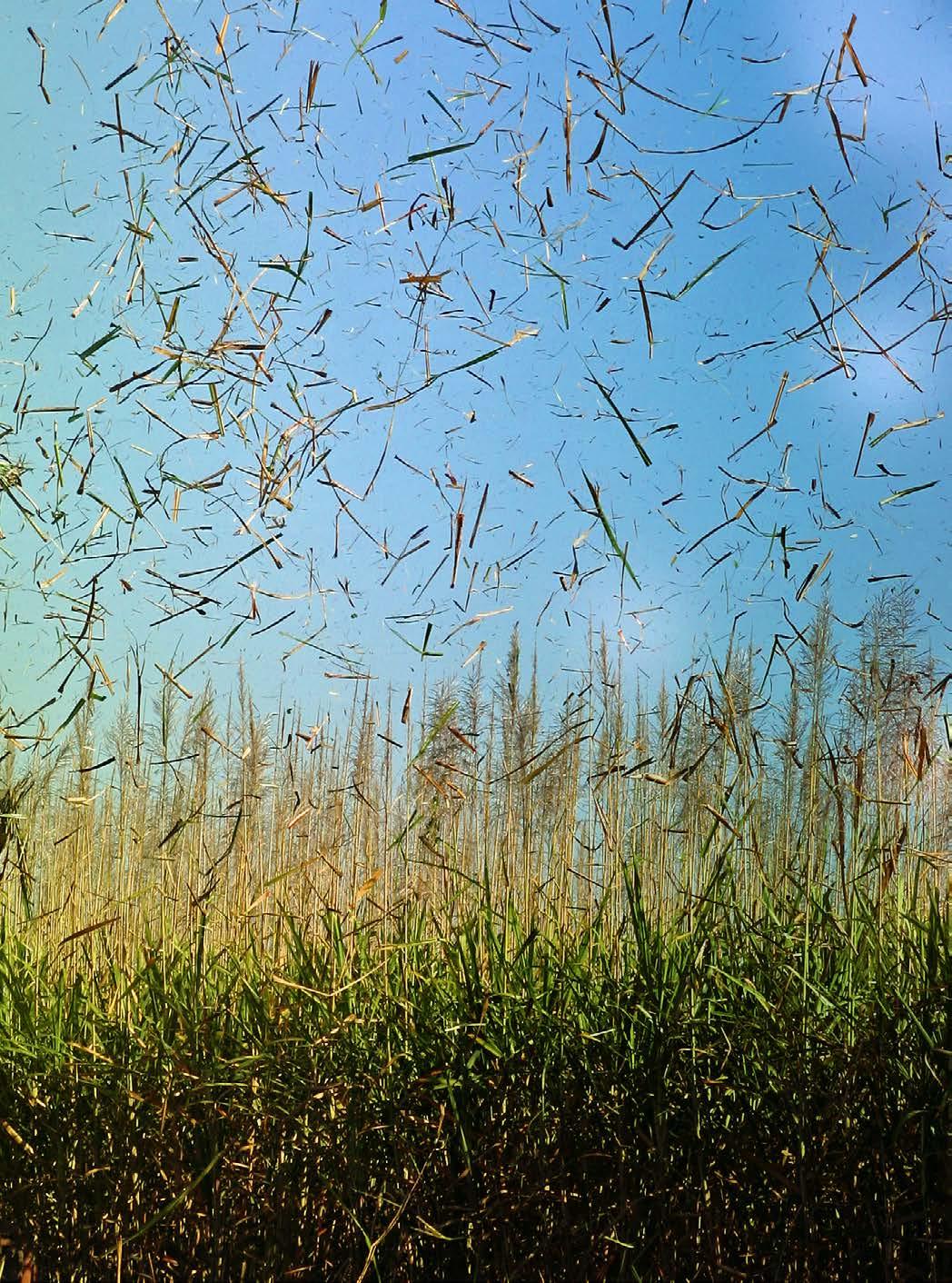
THE OFFICIAL MAGAZINE OF AUSTRALIA'S SUGARCANE INDUSTRY 44
THE IMPORTANCE OF ENSURING SUGAR CANE INDUSTRY WORKERS ARE CORRECTLY LICENSED
Under the Work Health and Safety Act, sugarcane growers are considered persons conducting a business or undertaking (PCBU), so it is important to protect yourself and your business from the implications of allowing unlicensed or disqualified workers, or those with restricted licences from operating motor vehicles or agricultural machines.
The Act imposes a primary duty of care on PCBU’s. This primary duty of care includes the duty to ensure the health and safety of workers whilst at work, as well as ensuring the health and safety of other persons is not put at risk from the carrying out of the business or undertaking.
Within this primary duty a PCBU is responsible for ensuring that workers hold a valid licence when operating motor vehicles and agricultural machines.
It is not just the employers who can be in trouble. Workers themselves also have a personal responsibility to ensure they are appropriately licenced. Significant fines, periods of disqualification and even imprisonment can apply to a worker who drives on a road whilst unlicensed or disqualified.
LICENSING REQUIREMENTS FOR AGRICULTURAL MACHINES
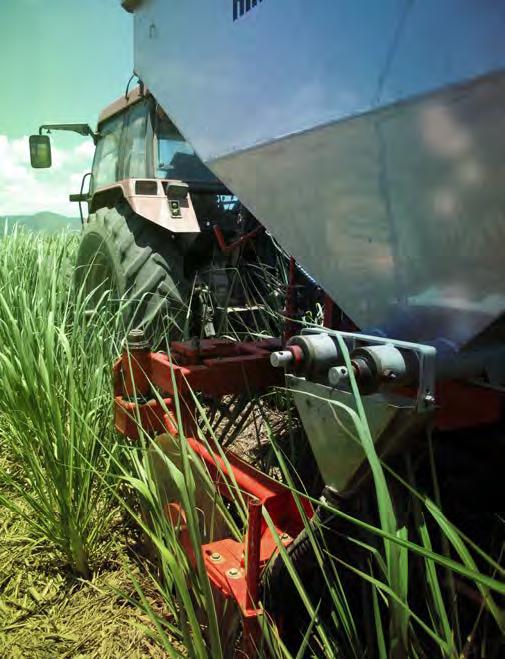
An agricultural machine such as a harvester or tractor, built with its own automotive power to perform agricultural tasks and used for agricultural purposes is classed as a specially constructed vehicle under the Transport Operations (Road Use Management—Vehicle Registration) Regulation 2021 and may be driven on a road by holders of a class C provisional, probationary or open licence.
It is important to note that a road is the entire area dedicated, notified or declared to be a road for public use. This means the road area includes the area from property boundary to property boundary and does not only include the constructed carriageway. The term road will also encompass a reserve for esplanade, track, stock route, bridge, causeway, culvert or other works in, on, over or under a road.
Whilst there are no licensing requirements for operating an agricultural machine on private property a PCBU will still have a duty to ensure the health and safety of their workers and others and therefore it is essential to ensure that the worker is competent to operate the agricultural machine safely.
LIABILITY AND INSURANCE
As a general rule employers are jointly liable with the employee for acts of the employee including in some cases their negligent acts.
The implications of allowing unlicenced, disqualified or restricted licence workers to operate motor vehicles or agricultural machines on roads can be very costly.
In the event of an accident, it is likely you will be prosecuted by WHS for breaching your obligations as a PCBU. It is also possible that you as the employer can be joined in any action to recover compensation. It is also possible that your insurer
may deem your insurance to be void and you may be borne with the costs of any damage caused by the accident.
Growers should ensure that only workers with appropriate skills and licence qualifications be permitted to drive vehicles on a road.
This article has been drafted by Elisha La Fauci in conjunction with Chris Cooper. It contains general advice only. The particular facts and circumstances of each case always need to be taken into account.
Any grower wishing to discuss aspects of this article or any other legal matter should contact your local CANEGROWERS office or call CANEGROWERS Legal Adviser, Chris Cooper, for free initial legal advice.
45 FEBRUARY 2023 – VOLUME45/NUMBER 2
CLASSIFIEDS
FIRST 5 LINES FREE* FOR CANEGROWERS MEMBERS! Book online 24/7 at www.canegrowers.com au or email us at ads@canegrowers.com.au
Next deadline is 18 February 2023
MOSSMAN-TULLY
Kubota M9540 4850 Hrs G/C $38,000 + GST. Two Ford 5000 articulated tractors coupled to 4 t side tippers $10,000 each + GST. One Ford 5000 tractor $8,000 + GST. Ph Jamie 0427089009
2x Ian Ritchie 6t side tippers. VGC. Ph: 0740562063.
Austoft A8800 Cane Harvester, New Motor, 1800 hrs, Walking Gear has done 1 Season, $90,000 inc. GST ono.
Ph: 0407630499 or 0428453640
Ford 8340 SLE 4WD $30,000, Newton 6T Side Tipper $5,000, JD 4055 with Newton 6T Side Tipper, $20,000, 2 x Complete Axle
Assemblies to suit HBM Tipper $600 for both. All +GST. Ph: 0429 652 235
HERBERT RIVER – BURDEKIN
2015 Austoft 8800 Harvester. Good Condition. Phone: 0499 888 919 or 0429 989 502
Dunlite 7kva Generator. Honda GX390 petrol engine. Good condition. $1250.00
Ph: 07 4777 3181 after 7:00pm
* As a FREE service to CANEGROWERS members, Australian Canegrower will print suitable classified advertisements UP TO 5 LINES FREE, FOR ONE ISSUE ONLY A charge of $5. 50 will apply for each extra line or part thereof. A charge will apply for advertising of non-cane growing activities. Advertisements must relate exclusively to cane farming activities, such as farm machinery, etc. Advertisements from non-members are charged at $11 per line incl GST. Only prepaid ads will be accepted.
2014 Holden Cruze Equip 5Sp manual Hatchback. Good condition. 101000 kms. Comes with RWC. Located Ingham area. $11,500 Ph 0431 185 129
International 1086 Trike (146HP). Tractor was manufactured as a trike from the factory and has the genuine front pedestal and twin front wheel set up. Complete with full set of front weights, standard 3 point linkage as well as a locally produced mid mount implement toolbar. Tractor is in good operating condition other than the aircon which does not operate. Selling due to lack of use and taking up shed space. $12,000+GST. Call 0429181276 for more information or photos. Ph: 0429 181 276
MACKAY-PROSERPINE
2 fan stripper $500, Moller single chain planter $4,000, 1 x Roberts 6T gooseneck trailers $5,000 each, Grubber Box $300, Hodge upright planter$300. Ph after 7pm; 0408 776 366
Massey Ferguson 8110 4-wheel drive with cab, 135hp, only 2,636 hours in good condition. $55,000 incl. GST. Ph: 0438606578.
12t self-propelled 6x6 elev infielder. VGC. Mackay. Ph: 0438606578.
6t side tipper on Leyland tandem. GC. Mackay. Ph: 0438606578.
Don Mizzi 741 model on Fiat 750 special turbo plus MF102 half-tracks to suit. Mackay. Ph: 0438606578.
BUNDABERG-ROCKY POINT
Bonel whole stick plant cane cutter 3 point linkage 500 dollars plus GST. Dual row fertiliser machine with 4 counters ground wheel drive 500 dollars plus GST. Ph: 0457447661.
Plant cane cultivator 2x1.6m. row w/ 3 weeder rakes and tines $2,200 incl. GST; Land plane w/ 4m. hyd. tilt blade $4,400 incl. GST; 2x1.6m. row cultivator w/ 10x 30ml. tines $2,200 incl. GST. Ph: 0408761463.
2019 John Deere 6175R,175 hp, 4WD, IVT Transmission, Starfire 6000 JD GPS, Front/ Cab suspension, Premium lights, 4 electric remotes, Front weights. 3600 hrs. UHF. Immaculate condition. Ph: 0419641518.
120” Howard HR Rotary Hoe, Teflon lined with crumpler roller. No oil leaks. Good working condition. Replacement blades required. $9,500 incl GST. Ph: 0419641518.
100” Howard S-series Rotary Hoe, good working condition. $6,500 incl GST. Ph: 0419641518.
900 Litre Croplands Spray tank 3PL with boom. Hydraulic needs some TLC. $3,500 incl GST. Ph: 0419641518.
HBM billet planter set up for dual row or single. $9,000 . (plus gst) Ph: 0413584728.
USED/NEW MACHINERY FOR SALE
SECONDHAND 8970 JOHN DEERE TRACTOR
NEW CYCLONE SLASHER/MULCHER
All machines located in Ingham.
DIESEL FITTER POSITION AVAILABLE
PARTS MANAGER POSITION AVAILABLE
Contact us via phone or email for further information.
SNG Machinery Sales
90 Origlasso St, Ingham
07 4776 6003 (Parts)
07 4776 1066 (Sales)
admin@sngmachinerysales.com
www.sngromano.net.au
Celli Tiger spike hoe, 2.5m wide with hydraulic crumble roller and oil cooler. VGC. Mackay. Ph: 0438606578.
6t side tipper Ian Ritchie, Excellent condition $15,000 + GST. Ph: 0478719294.
Austoft 1991 Wheel Harvester, set up for cutting plants. 2 blade chop, cuts nice billet. Air cond with new compressor and just serviced. Chopper box and basecutter box ok. Hydraulic valves resealed last season, with or without rubber rollers. Good Machine. $50,000 + GST ono. Phone James 0408 733 793.
2 row Bonnel fertiliser box with ground drive, $1,100 (plus gst) Ph: 0413584728.
600ltr Gold Acres tank/ 4 row Irvin Legs $4,400.
Bonel 1Ton Coulter Fert Bin $3,300.
Krone 3 furrow reversable mouldboard plow $5,500.
International Cane Cleaners single row $1,100.
2 row Bonnel fertiliser box with ground drive, $1,100 (plus gst) Ph: 0413584728.
46
Fiat tractors - 80 66 four-wheel drive with creeper box $10,000 (plus GST). 80 90 four-wheel drive with cab. $10,000 (+ GST) PH 0457447561.
WANTED
14 ton elevator bin and tractor 50klm box or more. Preferably JCB. Ph: 0400 794 857
Service truck/trailer set up for harvester. Must have a good compressor. Ph: 0437 503 818
POSITIONS VACANT
Rail Infrastructure Maintenance Supervisor – Mossman Full Time position which has been advertised on Seek. Please send an application including a covering letter via Seek or to HR@fnmilling.com.au For more information please contact Andrew Fischer on 0407 585 575
Full-time field worker position available. Knowledge in the use and maintenance of billet planter and spray equipment preferred. Ute and three-bedroom house with large shed/garage supplied. Email resume to briebrieestate@conxx.com
FOR SALE
Cane Farm for Sale, 124.95ha, 2 x Large Sheds, Machinery & House, Silkwood Area. Ph: 0467333989
Cane Farm Cooks Lane Victoria Plantation. 69.75 ha. 61.38 ha under cane. High-producing area. 1km from Victoria Mill. Road frontage. Ph: 0427912277.
70ha Cane Farm with 61.5 ha under cane. Located 8 km from town centre and 1 km from Victoria Mill. Property is flood free with town water supply running along property front. Paddocks have all been lasered and are well maintained and up to date with new varieties. Ph: 0427912277.
Cane farm to lease Munburra, Sunnyside or Oakenden areas. Have own equipment. Ph: 0408011983.
Classified: 1973 ford 5000 2wd with 4ton Newton side tipper $11000+GST .3m
niemeyer nr1411 Power Harrows $5600+GST Ph 0437184822
Brought to you by Australian Retirement Trust
Zero indicates either no rain or no report was sent. These rainfall figures are subject to verification and may be updated later. Weather forecasts, radar and satellite images and other information for the farming community can be accessed on www.bom.gov.au. Weather report sourced from the Bureau of Meteorology Recent Rainfall Tables.
LOCATION AVG. RAINFALL (mm) AVG. RAINFALL (mm) Month prior (Nov 2022) Month to date (1 Dec – 18 Dec) Year to date Jan – Dec Whyanbeel Valley (Mossman) 461.2 438.8 438.8 2946.2 Mareeba Airport 145 384 384 837 Cairns Aero 238.8 238.8 238.8 2008.5 Mt Sophia 312 383 383 3406.3 Babinda Post Office 631.3 74.8 74.8 4268.8 Innisfail 513.2 381.8 381.8 3547.3 Tully Sugar Mill 625.9 314 314 4073.1 Cardwell Marine Pde 420.2 298.6 298.6 2119.2 Lucinda Township 256.6 431 431 2126.8 Ingham Composite 256.8 353.2 353.2 2120.6 Abergowrie Alert 135 238 238 1372.7 Townsville Aero 72.6 395.2 395.2 1133.7 Ayr DPI Research Stn 86 569.2 569.2 935.6 Proserpine Airport 138.8 870.4 870.4 1435.7 Mirani Mary Street 144.2 677.6 677.6 1462.6 Mackay MO 112.6 661.2 661.2 1577.2 Plane Creek Sugar Mill 174.2 0 0 1739.4 Bundaberg Aero 48.6 85 85 1004 Childers South 80.4 53.8 53.8 896.1 Maryborough 161.2 101.4 101.4 1146.2 Tewantin RSL Park 110 47.2 47.2 1594.9 Eumundi - Crescent Rd 112.1 0 0 1676.5 Nambour DPI - Hillside 139.2 82.6 82.6 1813.5 Logan City Water Treatment Plant 58.2 47.9 47.9 1117 Murwillumbah Bray Park 73.1 47 47 1605.5 Ballina Airport 119.6 60.4 60.4 1786 New Italy (Woodburn) 98 115.4 115.4 1349.9
47 RAINFALL REPORT
Combed
$35.00
Pleystowe cane farm. On 2 Lots. Approx 190 acres all up. Teemburra water, 2 pumps & licences, plus 32,000 gallons an hour underground bore. Machinery/irrigation shed. 2x 4" soft hose irrigators, farm lasered, underground main throughout. 2 sidings adjoin farms. Access to farm from Pleystowe School Rd & Formosa's Rd. Does not include 2021 crop. Selling due to health reasons. Ph: 0408733793.
PROPERTY WANTED
Want to buy farm in Victoria Plains, Eton, Pleystowe area. Ph 049 00 29 387
Wanting to buy/lease cane farm in the Septimus area. Ph: 0417607722.
Wanting to buy/lease cane farm. Close to Racecourse mill, Tekowai, Alexandra areas. Ph: 0438545251.
Want to buy farm in the Mackay or Proserpine area. Must have two good condition houses and irrigation. Ph Paul: 0447545550.
WTB: Grazing & Irrigation Property. Grazing to run 300-500 head. 100 - 200acres irrigation. Located Sarina-Proserpine Regions. Ph James: 0429621145.
Wanting to lease - cane farm in the Walkerston/ Eton/Pleystowe areas and surrounds. Ph: 0421520331.
Find CANEGROWERS on Facebook! www.facebook.com/CANEGROWERSAustralia


Are you a CANEGROWERS member and want a FREE electronic version of Australian Canegrower delivered to your email inbox every month?
To receive your free electronic copy, email: editor@ canegrowers .com.au
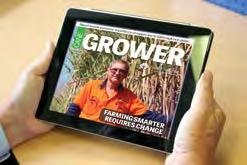
BUYERS BEWARE
WANT THE LATEST NEWS AND PHOTOS?
cotton and polyester CoolDry® knit polo shirts complete with embroidered CANEGROWERS logo
Buyers please be aware of scam emails when buying online. Scammers may try to intercept emails between genuine buyers and sellers by sending the buyer a fake invoice with different account details for the payment. Buyers should check with the seller by phone for accurate account details before making payment. (+ GST & delivery)
ORDER YOUR SHIRT TODAY! www.canegrowersshirts.com CANEGROWERS polo shirts now available CLASSIFIEDS 48
Sizes XS to 5XL for men and 8-20 for women
840 meters opposite Moore Park Beach. Coastal Cane Farm 93 Acres and 146 megalitres of ground water. Large storage Shed. 1 x Diesel Irrigation pump for the underground irrigation. There are 2 fenced off areas, currently used for horses and cattle. No house on this property. Comes with crop. Ph Larry: 0418496864.
Young grower wanting to expand. Looking for farms to lease. Mulgrave Area. Ph: 0431036229.
ACCREDITATION IS THE GOLD STANDARD
Smartcane BMP accreditation recognises the great work QLD cane growers are doing to farm sustainably.
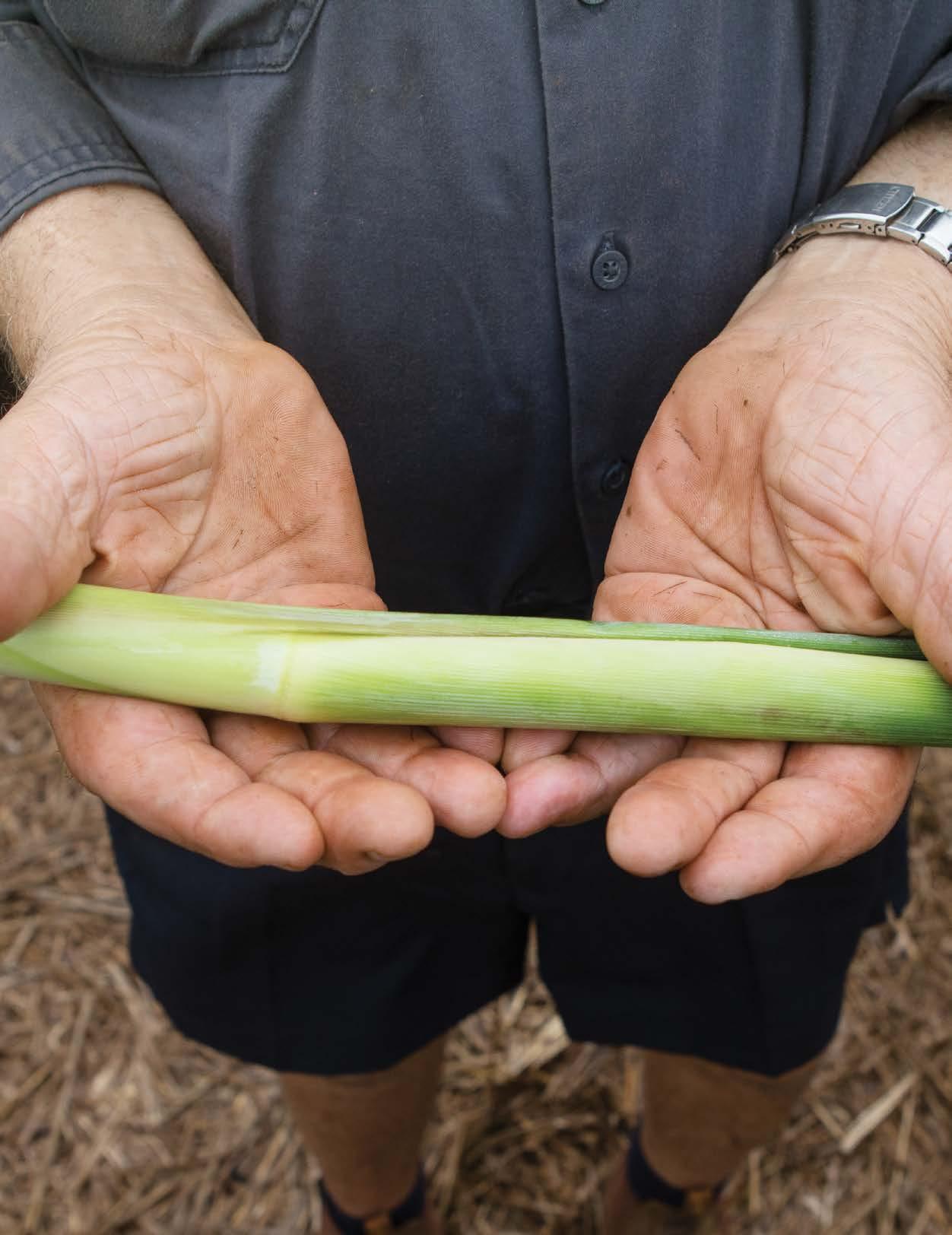
Growers are always looking for ways to improve their farm.
We take the latest industry research and make it relevant for each district and the way growers farm.
SMARTCANE BMP
smartcane.com.au
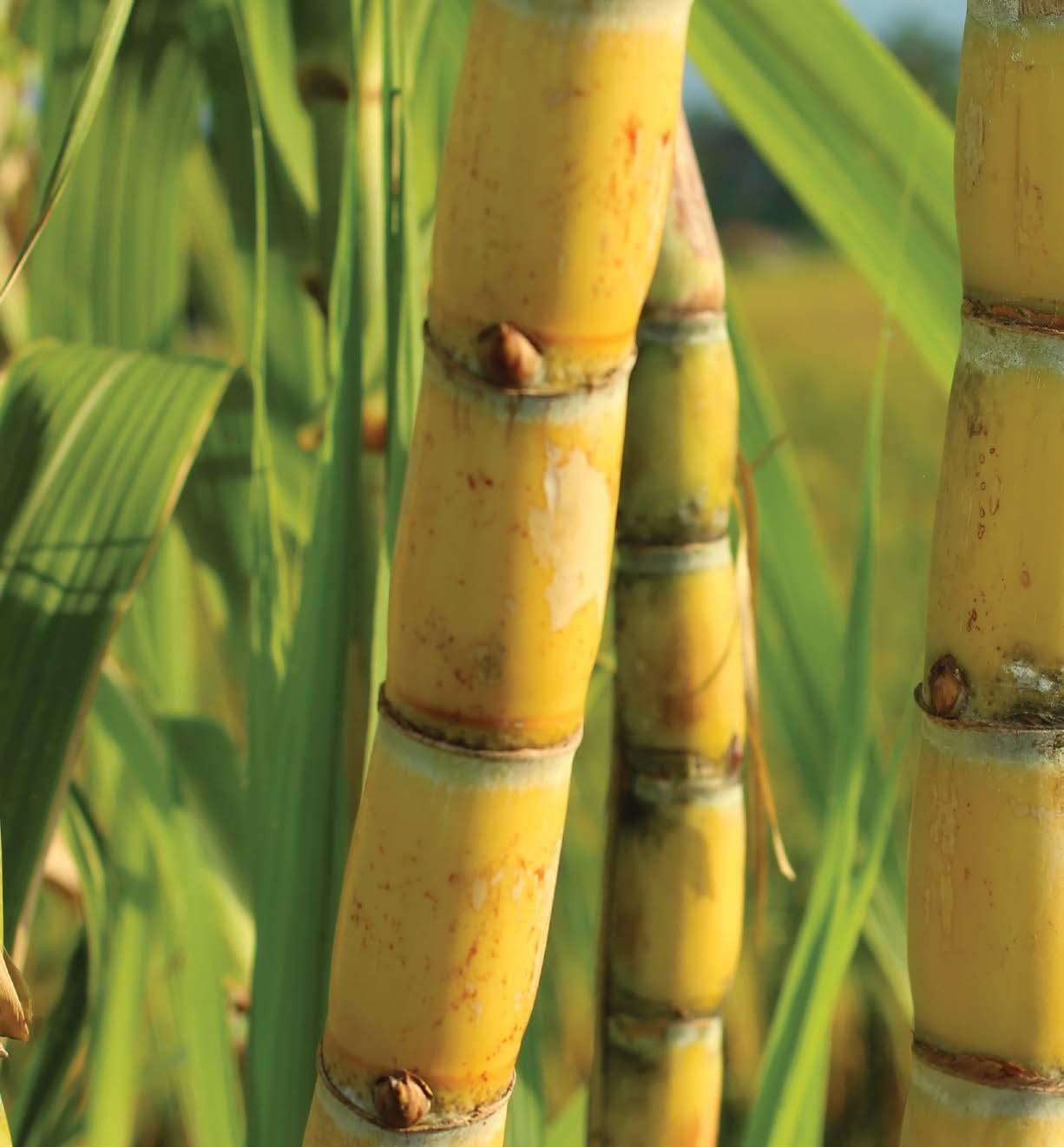





























 Photo: Supplied by Mackay Sugar
Photo: Supplied by Mackay Sugar




















 Damage caused by rats - Reinaudo farm
Damage caused by rats - Reinaudo farm











































